Text
At First Bite by Ruth Ames
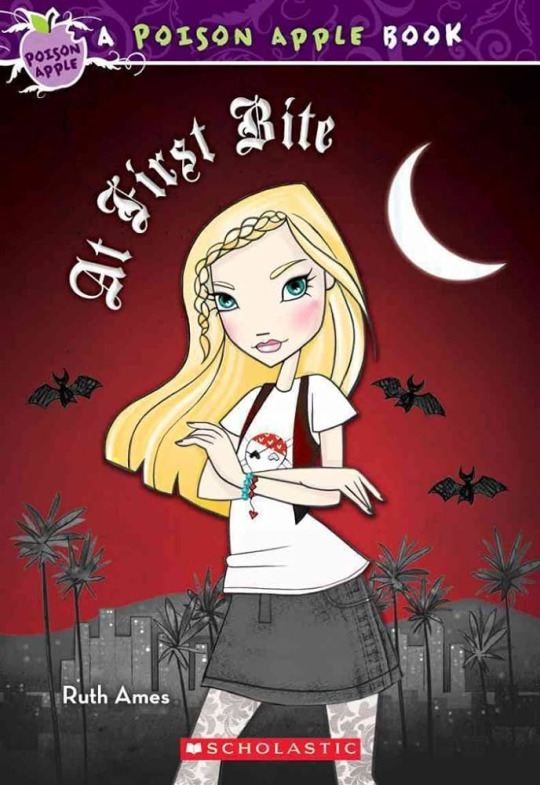
I bought this book within the last few years (last three, maybe?), when the local thrift store put it out as part of their Halloween items. Ever since I was young, I had wanted to read and own the Poison Apple books, so this was quite gratifying for me when I bought it. The price tag on the cover shows that I bought it for $.49.
The premise is that twelve-year-old Ashlee Lambert is moving from New York City to Los Angeles so that her mother can star in a reality TV show. If that big move weren't enough, Ashlee also has something else to worry about: being a vampire. And if *that* weren't enough, she also has to deal with The Dark Ones, vampires who feast on human blood, rather than small animal blood or blood substitute, who have recently appeared in Los Angeles. Ashlee's main worry for the majority of the book, however, is adjusting to her life in the warm climate (much harder on her vampiric nerves), and, more importantly, becoming just as popular at her new school as she was back in New York. But, when her first day goes poorly following a series of mishaps (a horrific sunburn, turning into a bat on accident, the janitor at school getting attacked by a bat and having his blood sucked), she finds herself growing closer to an outcast, Sasha, and her twin brother, Marc. Ashlee joins the theater committee as their wardrobe manager, just in time for their play, At First Bite (a story about a vampire falling in love with a human and turning her into a vampire as well), to start. However, things keep going wrong. A surfer at the beach is attacked, and then Paige, the resident popular girl at school and the lead in the play, is attacked as well. Ashlee decides to take matters into her own hands and find out who The Dark One attacking the people near her are so that she can save the play, save her school, and, most importantly, become popular. (And then, in a twist nobody saw coming, Ashlee realizes that being popular actually isn't that important and also that she has new friends that she likes more than the popular kids.)
This book... has been holding me back for several months now. I had started reading it back in October 2023, but then I became so busy, first with Halloween decorating and then with stomach issues, that I never finished it. I didn't want to start a new book before finishing this one, and I didn't have the time to, either, because of how busy I was because of the holiday season. That brought me into the new year. Still, though, I didn't read it, because I had a not-great impression of the book from what little I had, and began dreading reading it. Still, though, in February I picked it back up, determined to finish it, so that I could read books again and catch up on my book reading for this year. And then I kept forgetting about it. Until today, April 23, 2024, when I decided to read it because my internet went out and I didn't know how to reset the router (new router different from the old one I knew how to reset). And now, here I am, three or four hours later, having finished reading the book all in one sitting. And, good lord, I am *so* glad it's over. Not that the book was bad; it was a very middling book, cliched and largely uninspired, though I don't mind it too much; but because I finally finished my book and it's not longer hanging over my head, preventing me from moving forward and reading other books, especially ones that I've actually eagerly been wanting to read.
Anyway, what to say about the story... well, as I said, it was largely uninspired, not that that's a surprise. From both the Poison Apple and Candy Apple books, written for tweens in the early 2010s, it's exactly what I would expect. I didn't go into this book expecting anything groundbreaking, and I was not surprised when I received barely anything new or interesting. Although this is a criticism of the book, it's not a meanspirited one; truly, it is of little consequence or matter. I expected little, I received little, I was not let down.
Ashlee, the main character, was largely insufferable throughout most of the book. She was a popular girl who seemed to care very little about her "friends" and who was very egotistical, focusing mostly on what she cared about and what affected her and caring very little for anything else. Her obsession with becoming popular and her disregard for the people around her, especially her friends back in New York, and for Paige, the popular girl whom Ashlee explicitly mentions she wants to replace in the popularity hierarchy, was grating. Her desire to replace Paige was especially so, considering how blatantly she talked about it. I don't think Ashlee is a bad person, but I think she certainly was not raised correctly considering that was her attitude.
Sasha was charming, although she was quite one-note. Again, I didn't expect much from this book, so I was hardly surprised with as much, but it was still kind of sad. Still, though, she was a voice of reason on occasion, and her self confidence, while unrealistic for a tween in the early 2010s, was a nice change from Ashlee's egotism.
Eve and Mallory were Ashlee's friends in New York. I feel... a certain way about them. I don't know how to explain it. See, Ashlee spoke of them as if she looked down on them and possibly didn't even care about them, yet she was still hurt that they hardly ever messaged her back after she left. Which, yes, that's sad. Friendships ending is always sad. But... I didn't really feel bad for her, either. It seemed to me, though the book tried to deny it, that Ashlee really only saw them as pawns. I was honestly happy for Eve and Mal when they didn't reply to Ashlee and seemed to not really care. Although I have to assume that they'll probably one day just find a new queen bee to follow after, I was happy for them that they were free of Ashlee in the meantime.
Paige... I honestly feel quite neutral about Paige. But not as neutral as I feel for Ashlee. See, Paige honestly had the possibility to be quite interesting. She's domineering and headstrong, rude and obnoxious. She's like the evolution of Ashlee, something that our main character will eventually become if she continued on the path she had set herself on. But then... she was attacked by a vampire. She was found by Ashlee, and in that moment it seemed, to me, at least, that she trusted Ashlee. That she felt *safe* with Ashlee. A girl who, up to that moment, she had ridiculed and derided. And then the vampire who attacked her swooped in and tended to her, and she passed out. I don't know, I just felt... bad for her. She was tragic in that moment. She felt like she could've been the final girl of a horror movie. And then, later, after her hospitalization ended, she went to the play, the one which she had to miss because of the attack, and she watched it. And, shockingly, she complimented the girl who replaced her in her assigned role AND she complimented Ashlee's wardrobe choices. It honestly felt like she would be able to improve, to turn around after this. She invited Ashlee and Sasha (who took her part in the play) to hang out afterwards, and I think this would've been the perfect moment for the five (these three girls, plus Carmen and Wendy, Paige's versions of Eve and Mallory) to become friends and to mutually help each other. But... Ashlee turns her down. And this in itself would be alright, really. Paige had been rude to Ashlee and her friends almost the entire book, so it's completely understandable why one might not like to hang out with her. But then Ashlee goes on to think to herself how Paige (and Carmen and Wendy) will *never* change or get better. And then, immediately afterwards, Eve and Mallory text Ashlee, and Ashlee's tune changes immediately, from thinking only a few moments before about how her New York friends meant almost nothing to her because they had seemingly stopped caring for her, to saying how they would always be important to her and close to her. And I just... hate that. I hate how the author decided to end the book by saying that this young girl will never improve, despite the fact that she had made great strides by complimenting Ashlee and Sasha, and despite the fact that she very well could have become a better person following some introspection after her attack. I hate that Wendy, who showed she had true grit and drive when she immediately volunteered to take over Sasha's old role as stage manager, was said that she would never get better. I hate that Carmen, who complimented Ashlee's costume choices, was said that she would never get better. I hate that these three girls were a clear parallel to Ashlee and her friends, but because they're the antagonists they're never allowed to be more than they are. I don't know. I know I'm thinking too hard about it, but that just feels like a weird lesson to be taught.
Anyway, there was a fun Easter egg in the book. The Dark One who was attacking the students, the theater director, was named Mr. Harker. Harker is, of course, a direct reference to the character Johnathan Harker, Dracula's estate agent and one of the protagonists of the book Dracula. There was then another much smaller Easter egg later in the book, when a doctor was interviewed by a newspaper about the recent attacks happening around town, and his name was revealed to be Dr. Cullen Meyer, a clear reference to the Cullens, the vampire family from the Twilight novels, and Stephanie Meyer, the writer of said novels.
Speaking of Mr. Harker, I find him somewhat interesting, almost solely based on something he said. See, I had guessed he was the bad guy probably about a quarter or a third of a way into the book, both because it added up and because mostly he was such an Easter egg because of his name that frankly I couldn't believe he wouldn't be important in some way (though I briefly felt the same way about Dr. Cullen Meyer and that belief was not rewarded). But even at that point I really wasn't interested. No, it wasn't until the end of the book, after Harker had been captured, that I was interested in him. He explained that he had been led astray by the other Dark Ones when they recruited him and mentioned that he had never wanted to attack so often, and that he certainly never planned to attack children, but that he couldn't help himself, because the hunger was too great. And to top all of it off, it seemed as though he was truly remorseful and sorry. He also mentioned prior to all of this hoping to be a second mentor to Ashlee, and though the implication was that he was hoping to turn her into a Dark One, too, it struck me how sincere he was throughout the entire affair. When he mentioned the line about the hunger being too great, I felt bad for him. I didn't blame him, then, not when he had been corrupted and could no longer control himself. Though the book said that only bad people could become corrupted (a lesson which is problematic in and of itself), I didn't believe that was the case. I think anybody could become corrupted, both because that makes more sense and also because it makes it more tragic and interesting. A beloved teacher was led astray and taught the dark ways and can no longer control himself even around the students who he cared so greatly about, but a shadow of that care still remains when he hopes to become a mentor to his vampiric student. I know of the connection between sex and vampirism, and I know that his wanting to mentor her was basically a declaration of pedophilia and the intent to corrupt her, and frankly that in itself is an interesting angle to view it from (and an angle in which it is especially important to say that *anyone* can be a Dark One and that there is no specific type of person who is intrinsically evil, but I digress), but I prefer the one I was envisioning, with him being unable to stop himself. Though, of course, the two can coexist together. His exit from the story, for all of this, was rather anticlimactic, though. They say the Vampire Council will deal with him properly for all of his attacks, but the only punishment that we truly hear of is that he is being made to "admit" to the school that he brought a pet bat to school which got loose and attacked people, and that, in turn, would result in his being fired. Which... is stupid? I mean, beyond the humiliation aspect of it (which I'm not entirely sure is justified, frankly), I also just don't understand why they couldn't have had him resign/quit effective immediately. The result would've been the same in the end, minus the humiliation aspect. But that still begs the question of what exactly the Council will do to punish him for attacking humans. The Vampire Chronicles makes me think that being left out in the sun to die is the only proper punishment for breaking the rules, but beyond the fact that the sun doesn't kill vampires in this book, there's also the fact that the book shies away from death quite obviously, even mentioning that even The Dark Ones don't kill their victims. So, what will his punishment be? Being locked up forever? Being starved? The Dark Ones get sick without human blood, so can they ever be freed from their human-blood-desire, or will they always be desiring it? Is it an addiction metaphor? And if so, is there some sort of blood rehab they can go to, or are they always cursed to never get better and always be the same? And if that's the case, what's even the point? Is that even a better fate than death at that point? I don't know. Mr. Harker was a character that really wasn't that interesting, but whose
(I hit text limit block on the previous paragraph so I had to start a new one) lines and actions make me think more about the world within the story and which make me pity him. He's not interesting, but he's still interesting. The story as told from his point of view would be interesting, I think.
Although the book is, again, overall inspired, I think there were some interesting parts overall. The worldbuilding is the most consistently interesting one, I think. Sanga!, the blood-replacement drink, Vampire Councils, vampirism being both an affliction that can be given to humans *and* a genetic affliction which can skip multiple generations before reappearing in the bloodline, vampires receiving their powers at the age of 12, there being a vampire side of the internet which vampires can do vampire-specific things, like order Sanga! from, the fact that human blood is seemingly addictive but that animal blood isn't, and how some vampires seem to prefer animal blood to Sanga!... these are all interesting details. I think there were characters other than the main character that were also quite interesting, like Mr. Harker and Paige. But, for these notedly good things, I think the book itself was a miss. I think the author had a lot of good things they could've done with it, and had a lot of things they could've chosen from, and ignored all of it. I think a book (or, more honestly, a chapter) from Paige's point of view, focusing on how her outlook on life has changed following being attacked, could have been good. I think a book (yes, book), following Mr. Harker after being corrupted and going from there, through the events of this book, to whatever happens after this, would have been interesting. But, I also think that, in the case of the former, the author probably wouldn't have done a good job of writing it, and in the case of the latter, the book genre itself would've been too limiting. I think the book was good for a read, but I think just by virtue of my not being a twelve year old it was destined to always fail by me.
It was an okay book. I probably wouldn't read it again, but I *will* keep it because my younger self would want to. 2, maybe 2.5.
My bookmark for this book was a to-do list with knitting projects that I had planned to make for Christmas.
#october 2023#april 2024#(and theoretically every month in between#although i didnt read it at all between the two months#and technically i started over from what little i read in october when i picked it back up in february#and then i promptly put it back down until i picked it up in april and read it all in one sitting)
0 notes
Text
Book Rank List 2023
I really dropped the ball for 2023, at least at the end of the year. I just got overwhelmed, and then my stomach started hurting again, and I didn't have the time nor the motivation to read... I really need to start back up on it. My dream is to read enough to catch up on the time I missed in 2023, as well as to catch up on what I haven't done for 2024 so far. We'll see if it happens.
Overall Best Book of 2023
1. This One Time With Julie by David Lampson (5/5)
2. Speak by Laurie Halse Anderson (5/5)
3. My Favorite Band Does Not Exist by Robert T. Jeschonek (4/5)
4. Over the Moon by Elissa Haden Guest (3/5)
5. The Alchemy of Forever by Avery Williams (3/5)
6. One of the Survivors by Susan Shaw (3/5)
7. Arclight by Josin L. McQuein (2/5)
8. The 13th Reality: The Journal of Curious Letters by James Dashner (2/5)
9. The Beautiful Between by Alyssa B. Sheinmel (1.5/5)
Unranked in list but ranked here from greatest to least: Can You Keep a Secret? by various authors - 4/5 , The Valentine's Day Disaster by Brandi Dougherty 4/5 , Totally Crushed by Eliza Willard 3/5 , Callie For President by Robin Wasserman 3/5
Unranked in list and unranked here, but still included because I read them: Ben 10: Mecha Madness, Ben 10: For Science, Ben 10: The Manchester Mystery, Ben 10: The Creature From Serenity Shore
Most Interesting Premise, Regardless of Execution
My Favorite Band Does Not Exist by Robert T. Jeschonek
Arclight by Josin L. McQuein
The Alchemy of Forever by Avery Williams
Best Cover
Arclight by Josin L. McQuein
Over The Moon by Elissa Haden Guest
The 13th Reality: The Journal of Curious Letters by James Dashner
Want To Rewrite
Arclight by Josin L. McQuein
The Alchemy of Forever by Avery Williams
Over The Moon by Elissa Haden Guest
Best Protagonist
Melinda - Speak by Laurie Halse Anderson
Joe - This One Time With Julie by David Lampson
Idea Deity (not including Reacher Mirage) - My Favorite Band Does Not Exist by Robert T. Jeschonek
Best Villain
Honoria - Arclight by Josin L. McQuein
(the rest of the books either didn't have actual villains, or else the villains weren't good enough to go here. The only one that even came close was Cyrus from The Alchemy of Forever by Avery Williams)
Best Deuteragonist or Side Character
Mattie - Over The Moon by Elissa Haden Guest
Anne Marie/Annie - Arclight by Josin L. McQuein
Kate and Alexis - The Beautiful Between by Alyssa B. Sheinmel
Sato - The 13th Reality: The Journal of Curious Letters by James Dashner
Donate Pile (No Specific Order)
The Beautiful Between by Alyssa B. Sheinmel
Arclight by Josin L. McQuein **
The 13th Reality: The Journal of Curious Letters by James Dashner ^
Keep Pile (No Specific Order)
Over The moon by Elissa Haden Guest
Speak by Laurie Halse Anderson
This One Time With Julie by David Lampson
One of the Survivors by Susan Shaw
My Favorite Band Does Not Exist by Robert T. Jeschonek
The Alchemy of Forever by Avery Williams
(All of my Valentine's books)
(All of the Ben 10 comics)
^ = originally this book was in the Keep Pile, but after some debate, I decided that I couldn't see any reason to keep it.
** = This book as it CURRENTLY STANDS is in the Donate Pile, but I find myself debating whether or not it should be moved to the Keep Pile in the end
#book rank list#2023 book rank list#almost a full month late and several books shorter than preferred but in the end i completed it
0 notes
Text
Over the Moon by Elissa Haden Guest
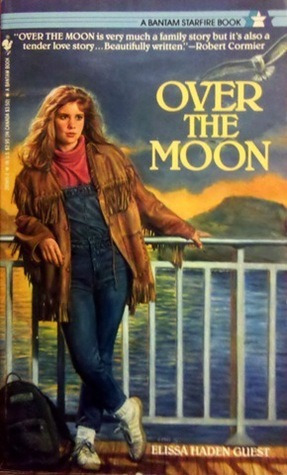
I've presumably owned this book for a few years now, though I don't remember getting it. There's a price tag on the cover proclaiming it to be $.69, looking to be from the local thrift store. I think I chose this book both because it's short and also because I was intrigued by the summary.
The premise is that Katherine "Kate" Baker is a 16 year old girl who lives with her great-Aunt Georgia and her brother Jay. Four years ago her sister Mattie moved/ran away from home with her 28 year old boyfriend, Dean, greatly disrupting their lives (which were already disrupted, after the three kids lost their parents when they were younger and had to move in with Georgia). Kate feels an emptiness growing inside of her that she can't quench at home. She and Jay visit New York, where they used to live when their parents were alive, and they visit with an old family friend, Andy, and Mattie's old boyfriend, Will. While there, Kate proclaims her love for Will, whom she's had a crush on for almost as long as she's known him, and he gently rejects her, saying he's still in love with Mattie. The emptiness grows inside of Kate as she heads home. Shortly later, she receives a package in the mail - a beautiful handmade jacket with fringe, made by Mattie. Kate calls Mattie and asks if she can visit her, which Mattie agrees to. Kate travels and eventually she's pickpocketed at the bus station. A new boy, Max, comes to her rescue and offers her a ride, which eventually turns into a place to stay, which eventually turns into driving her almost all the way to her destination, minus a ferry ride, and all the while chemistry is growing between the two. They kiss before they part and then Kate is in Nova Scotia, at Mattie's house. She learns that Dean left Mattie and their ten month old daughter, Katherine, a.k.a. Kit, named after Kate. Kate tries multiple times to convince Mattie to return home with her, noticing the strain raising a child as a single working parent is taking on Mattie, but Mattie is resistant to the idea. Eventually, though, she agrees, and the three of them drive home. Aunt Georgia and Jay reunite with Mattie and Kate gets a love letter in the mail from Max and she feels whole once again.
I had relatively high hopes for this book. I either remembered reading it when I was younger, reading the synopsis and thinking it would be interesting when I was younger, or I was confusing it with another book for which one of those possibilities was true. Either way, it didn't quite live up to my expectations. It was still an alright book, but it felt like it had a really good/interesting concept that immediately fell flat, and that was almost entirely because of the Max plotline. I don't think romance had any place in this book. I think this book could have only been about familial love and it would've been much, much better.
Y'know, it's kind of funny to read this book as an adult and side with the adults. Georgia was right, Dean WAS too old for Mattie! I was so ready to side with Mattie about going with Dean, imagining he was saving her from her home life (which, in a way, he was), but Dean was 28 years old and Georgia was 16. That age gap is absolutely disgusting. The classic signs of grooming were right there: isolating the victim from their support network, getting the victim to trust them by giving them things like gifts or attention or sharing secrets, etc. I wouldn't be surprised if they had sex while she was still a minor. He was an adult and he allowed her to run away with him. If I read this book when I was younger, then I can remember thinking the idea was so romantic, an older man falling in love with a charming teen girl and them running away together because her family won't allow them to be together, but now that I read it I just feel bad for Mattie.
I feel a few things for Will. I feel bad for him that he still loves Mattie and maybe he always will. I feel glad that he didn't fall in love with Kate. I feel suspicious that he didn't realize how he was sort of leading her on (although there is a possibility that Kate is a bit of a unreliable narrator, since she, you know, had a crush on him and her feelings were making everything kind of blurry). I feel angry at him because he never really understood what Mattie needed or felt. I feel understanding because he was a teenage boy who didn't know any better.
I highly empathized with Mattie for the entirety of this book, even at the beginning before we ever truly met her. I felt bad for her because her entire family was acting as if she had turned their back on them which, to be fair, I understand to an extent, but it still the whole story. I felt bad for her when Jay said he didn't care about her anymore, I felt bad for her when Georgia refused to speak about her, I felt bad for her when Kate couldn't understand her, I just felt bad for her, period. She was groomed by an adult into being a perfect girlfriend and then wife. She was under everybody's expectations. She was drowning with no land in sight. She was practically set up to fail. She was made out to be a bad guy in her family, when there was just about nothing that was truly her fault. Hell, even not keeping contact with her family wasn't really her fault - she was isolated from them and that same isolation, mixed with her pride, wouldn't allow her to contact them. If it weren't for a single moment of clarity by which she sent Kate that jacket, I wonder if she would've ever contacted them at all. To me, that kind of seemed like her last hope, like firing off a flare. I wonder if she would've caved to despair at some point if she hadn't.
Funnily enough, I had trouble empathizing with the family as a whole for their feelings towards Mattie, so I guess you can tell who I felt more connected to, haha. I understand logically their thought process - Georgia was angry, scared, and hurt that Mattie ran away (angry Mattie didn't listen to her and angry she herself wasn't able to stop her from leaving, scared that Mattie would get hurt or already had been and she had no way of knowing, and hurt that Mattie chose to leave instead of stay with family), Jay was embittered that she left, and Kate was confused, jealous, and angry (confused why she would leave and what she had to gain by leaving, jealous that Mattie got so much attention even when she was no longer with the family, and angry that she left in the first place thereby leaving a shadow where she used to belong), but I just can't feel as bad for them as I did for Mattie. There isn't really an observation about the book here, just an observation of myself and how I relate to it.
Y'know, there was one thing that I thought was really interesting about this book - the world. The book was copyrighted in 1986, only 11 years before I was born, and it's interesting to see how different things were back then versus how they are now. Now, granted, this is a YA book so the world is obviously going to be a bit more idealized than it really was, but it's interesting to see how... trusting people were. Kate senses no suspicious motives from the girl who pickpocketed her, and she felt comfortable driving with Max even though she had only known him for, like, an hour. Of course, part of that can be attributed to her age and to how sheltered she was in her life, but I don't think it's a stretch to admit that people weren't as scared of each other back then as they are now, especially considering that was right in the middle of the "Golden Age of Serial Killing" (1970-2000). It would be a dream to live in a world that trusting. I think if you were to bring me back there, I wouldn't know how to act. I might be even more scared of it than I am now. I might be even more wanting for it than I already am.
Max... ohhhh, what can I say about Max? He wasn't a bad character, truly. I thought his sister was somewhat interesting (I liked how she thought it was pathetic that her dad was marrying someone her age, though I didn't like how she blamed the girl for it). I appreciated that he, himself, pitied the girl his dad was marrying. I appreciated how he was kind to Kate and wanted to help her even though he didn't know her. His relationship with Kate was very cutesy and picturesque, but that relationship is also the biggest problem in the book. Their relationship went so easy it was kind of frustrating, but I guess it's not really the point of the book so it doesn't make sense to spend a lot of time on conflict within it. That said, I would've been impressed and kind of happy if they never got together, not because I wanted them to fail, but because I think it would've been fresh to read. Maybe it wasn't fresh back then (unsure), but it's fresh now. Anyway, the entire book acts as if it's going to really explore the relationship Kate has with Mattie and how it's affected her life, which it does to an extent, but... not enough, I don't think. It would have been fine if Max was just a roadblock character, one that we only spend a few minutes with and then move on, but he wasn't. We had a sizeable chunk of the book dedicated to him; 50 pages dedicated to Max and Kate's relationship to him, versus 40 for Mattie (I don't count the entirety of the book being part of Mattie's story, since although she's the catalyst for change and the driving factor, she isn't the main side character for most of the book). Listen, I like Max well enough, but I don't think he deserved that much of the book. Yeah, it allowed him and Kate to really get to know each other, but I was only interested in the book for Kate and Mattie's relationship. I think Kate could've liked Max, and the author could've set it up so that it was implied in the future they would find each other again or something, but I definitely don't think a large section of the book needed to be about Max. To me, in the end all he was was just a brick wall placed in the middle of the road. I had an idea in my head that it would've been interesting if Dean was Max's dad. I knew he wasn't, but I thought that would've been a fun connection to explore, one which might've been a good reason to give Max more pages. In the end, it just seemed like Kate's relationship with him healed her more than anything having to do with Mattie.
It was fun realizing so often just how young and immature Kate was. When she couldn't understand why Mattie couldn't go back home (fear, pride, and having built a life in Nova Scotia), or when she was angry at Mattie for not remembering the little things from when she and Kate still originally lived together (the speed of her life, having a child, willfully forgetting, having the memories forced out by Dean, etc.) and didn't understand how she could forget when they were things that were important to Kate, etc. I think the author did a really good job of making Kate a believable teenager with believable teenage thought processes. It was interesting, when Kate realized that Mattie's life wasn't romantic, but rather quite miserable, because I found myself questioning if she knew it wasn't romantic because it was a mature moment, or if she only thought that because she was angry at Mattie. And, later, Kate refused to see Mattie's side of things and why she might not be willing to go back home with her, nor would she listen when Mattie was all but vocally begging her to stop asking her to.
Mattie was easily my favorite character of the entire book. Yes, because I empathized with her and saw myself in her to a certain extent, but also just because of her life and struggle in general. I think the only thing I would've changed is that I would've made her still love Will, actual love, even if they were fated to never be together again. If, after everything that happened with Dean, she realized that she still loved him. It makes sense, of course, that she didn't, and I understand completely why she wouldn't, and in her shoes I probably would've felt the exact same, but perhaps that's the romantic in me. I loved that Mattie felt so overwhelmed by everyone's expectations of her that she felt she needed to run away as fast as she could, and how she (presumably) ran to Dean because he had no expectations for her other than to be his girlfriend. She had no friends left and she had no family she could turn to (besides her sister, for whom it was a wild guess whether or not she could talk to her) and she was raising her daughter all alone with only the occasional monetary support from her (ex?) husband and she had a job knitting sweaters on top of that. I just... really like her. I wish I was strong like her. I wish I was weak like her. Maybe I even wish I was her, scars and all.
In the end, it was a very rushed and anticlimactic ending. Part of this is, I think, because so much time was spent with Max, but also because things were so easy and fast to wrap up. Kate and Mattie had no trouble going back home and Georgia and Jay welcomed Mattie back pretty easily, even though they said some pretty mean stuff about them (which I will include the quotes below). I understand tears at the reunion, but we never got to see the big emotional blow up that was sure to be coming later. This book could've been a really interesting dive into the characters and their relationship with Mattie, showcasing a nice, complex way of viewing things, which it was... to an extent. But it fell short on the matter the longer the book went on. Sure, maybe this is on me for setting up these expectations on a YA book from the 80s, but I don't know... it sucks to see a good concept with not the best execution. I'm glad that Mattie went home in the end, but I'm not happy about the circumstances that surrounded it. It isn't that easy, and maybe it could or should be, but it just is not. Kate told Mattie to come home and it took less than a week to convince her, even though she had run away from home years ago and had built up a life in this new town. I really, truly think if the Max plotline was just taken out or, at least, reduced, it would've made the book infinitely better. A shame, to be sure, but not a huge surprise.
Quotes I enjoyed from the book:
-
"Sometimes I think if she was dead, this would still be happening. That somehow, even as a corpse, she'd still have the power to tear us all apart" - said by Jay.
-
"But I can't help feeling the way I do about Mattie. I hate her for leaving us, for making us feel like we were dirt, like we were something she had to get away from."
"Part of me hates her, too," I said. "For putting me in the middle all the time, for making everything so difficult. But it's been so long since I've seen her-- Don't you see, Jay, I don't know who she is anymore."
"Well, maybe that's the difference between us," he said softly. "Because I don't care who she is. I guess I just don't care anymore."
-
"It occurred to me that she had fled home thinking she might be able to drop the pain en route to someplace new. Thinking she might be able to scatter it from the back of a motorcycle in bits and pieces, like ashes."
-
Pretty enjoyable book in the end. Some grievances, but nothing too bad. 3.5-4/5 (erring towards 3.5).
My bookmark for this book was a neon yellow-green ribbon with knots tied at either end.
#september 2023#this book was finished probably around the 28th of sept but i didnt get around to finishing the review until october
0 notes
Text
The Beautiful Between by Alyssa B. Sheinmel
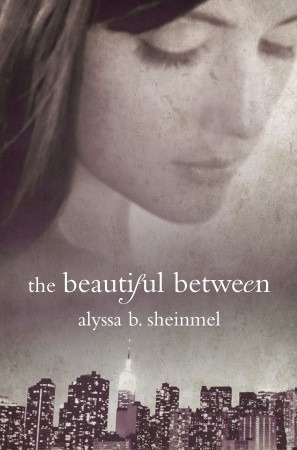
I've presumably owned this book for a few years now, though I don't remember buying it. It's an Advanced Readers copy as proclaimed by print on the cover, and I bought it for $0.50. I assume it came from a garage sale or a thrift shop, but not one that I usually go to. I think I chose to read this book because I wanted something short and fast because I knew I wouldn't be in the mood for reading a book since my father had a double bypass surgery for his heart this month. In fact, I almost didn't read any book at all this month, but managed to read this one in less than two weeks after feeling bad for nearly breaking the streak.
The premise is that Connelly Sternin has lived for almost her entire life not knowing how her father died, only that he was dead. After his death, she and her mother became a little more distant following young Connelly's asking about his death, and ever since then Connelly has avoided the subject, instead telling classmates that her father and mother had a bad divorce rather than admitting his death and not having answers for the questions that were sure to follow. Then, everything changes when Jeremy Cole, the most popular boy in the school, befriends Connelly, and, with him, his little sister, Kate. As Connelly and Jeremy become closer, she learns the real reason he sought out her friendship: because Kate is sick with leukemia, the same thing that killed Connelly's father. She's shocked when Jeremy tells her this, because she didn't even know that he was sick. But, there's more to the story she learns as she digs deeper. Finally, when Kate succumbs to her sickness, Jeremy pleas for Connelly to find out the truth for her own sake, and she has a hard conversation with her mother that ultimately reveals the truth: her father was depressed and went off of his antidepressants for chemotherapy, but because of this, he killed himself by overdose. The truth finally sets Connelly free.
Listen, I... really don't have a lot to say about this book. I read this book once a decade ago, when I was a teenager, probably roughly 15. I only know this because I actually corrected a few grammatical/spelling/punctuation errors and dated the corrections back then. I can, I believe, remember actually thinking the book wasn't very good even back then. About 60 pages from the end, I see a remnant of the past, from the first time I read this book - I had finally noticed (or, perhaps, had noticed before and only finally decided to mention it) one of the numerous typos the book had and deigned to correct it in pencil, then dated it: 10-8-2023. A few pages later, I corrected another mistake and dated it 10-18-2023, ten days later. A little over a month short of a decade, from the time I was writing this observation originally (rewriting it for the summary puts me at about a week, give or take a few days, out). This book doesn't wow me at all, doesn't impress me, and up until this point I was positive it would be on the donate pile. It still is, but... I also kind of want to keep it, just for the past that's there. How funny.
Now then, on to the meat of the story. Or, rather, the main character: Connelly Sternin. Connelly goes to a rich private school, the type that children of celebrities go to, is raised by her single widowed mother, in a two bedroom apartment in New York City. This, of course, all speaks to money. Connelly of course is quick to admit that she ISN'T rich, not like those other rich people and celebrities, just that they're comfortable. A rich main character isn't really an issue, I don't think (although, make no mistake, most of the YA books I've read with rich main characters have been pretty bad), but the richness is the last in a line of things that make Connelly unbearable. Connelly acts as though she's no big deal, often putting herself down, but she also simultaneously tries to stand apart from the crowd and separate herself, acting very high and mighty. She laments not having any friends, while simultaneously refusing to get close to anybody, not even her classmates/lunchmates. She's nearly obsessed with comparing herself to a fairy tale princess; her most favorite is Rapunzel, but I'm pretty sure she also mentioned Aurora (Sleeping Beauty), Cinderella, and Snow White. She feels like she's "locked up in a tower" (her apartment, by her mother, whom she admits isn't really an evil witch, but still a jailer of sorts, although I believe the mother's only real sin was grieving- though I digress) and like she's "been waiting for a prince to save her all her life". Everything about her screams entitled and the like the type of girl who thinks she isn't "like other girls". She laments her loneliness while simultaneously trying to push away everybody who she deems unworthy of her attention. She's very grating, very annoying, and exactly what you might expect the type of nerdy girl who goes to a private rich kid school would be like.
Connelly admits multiple times throughout the book that she doesn't see her lunchmates/classmates as being her friends. Her closest acquaintances are Alexis Bryant and Emily Winters. Emily Winters seems to be the one to start conversations more often with Connelly, and they've known each other since they were very young girls, probably at least first grade. When Emily asks Connelly if she and Jeremy are dating at one point later in the book, Connelly wonders if she and Emily are even close enough to talk about that, or if she only cares because she wants gossip. I have to say, the fact that she didn't know speaks a lot. I don't know if Emily actually sees Connelly as a friend or just an acquaintance, but even I felt hurt at the insinuation that Emily wasn't allowed the curiosity. As for Alexis, well... where do I begin? Alexis has anorexia. We know this not just because of the rumors of it flying around school, but also because every day at lunch Alexis will spend the entire lunch period cutting up a single leaf of lettuce into tiny pieces and then eating them as slowly as possible. In fact, this behavior is something that Connelly and Jeremy, once he befriends her, sit and stare at for multiple days. They even talk about it and make jokes about it and liken it to watching a train wreck because they can't look away. Connelly thinks Alexis secretly likes the attention. Connelly also says that nobody cares about Alexis's anorexia because it is, and I quote, "so 90s." At one point in the book, Alexis is sent to hospital/rehab for her anorexia, and all Connelly says about it is that she hears rumors that people aren't sure if it's rehab for meth or if it was for the anorexia. And to this all I have to say is... wow. I know I shouldn't be surprised at these types of attitudes, especially from a book written in 2010 or earlier, but still. I felt so, so painfully bad for Emily and especially for Alexis. For Emily, it was sad because she seemed to genuinely think she and Connelly were friends, whereas for Alexis it was sad because seemingly nobody really worried about her, or, at least, the person she ate lunch with every day didn't, and only cared enough to watch her eat. Connelly laments "never having had a best friend", but to me it seems as though she brought it entirely on herself. She is the one to blame.
Frankly, Jeremy was a more interesting character than Connelly. He was the "prince" of the high school (in Connelly's words), able to easily flit between all the social groups. His family is the top of the pecking order, the highest of the high. His little sister is dying but he's trying to put on a brave face and can't tell anybody about it. He seeks out Connelly because he just so happens to hear that her father also had the same sickness Kate had, and he needs help to understand, or, at least, to come to terms with it all. He was on top of the world until it all came crashing down with her death. Still, despite it all, he tried to be there for Connelly. I think all of that makes him much more interesting than the actual main character we had.
Four things I thought were good or interesting about the book: the first is that, knowing that Kate was going to die thanks to the previous time I read the book, the blatant foreshadowing of her death was kind of funny. Two, Kate and Jeremy's families were both Jewish. Theoretically, I could point out that making your rich characters Jewish could be a slippery slope, but I think the author might be Jewish, so it's okay. Although I wish there was more talk about Jewish cultural practices and things, what little we got was interesting, so it's okay. Third, Connelly's dad dying from suicide was genuinely a surprise. I truly did not expect it, and only caught on to it about two sentences before it was explicitly stated. My running theory, up until that point, was that he was executed in prison after getting incarcerated and put on death row for a terrible crime, like rape or murder or something. This was because throughout the book it was described as though his death was something horrible, never to be spoken of. I was relieved when that was all it was. Fourth, and finally, I liked Kate. She was very endearing, which was exactly what she was meant to be, so I guess the author did a good job at that.
This book had a lot of errors (typos and punctuation errors mostly). I'll give it the benefit of the doubt and assume that a lot of them were cleaned up before final printing, since this was an advanced reader's copy, but it was VERY noticeable while reading. One other thing I want to say which wouldn't fit elsewhere in this review and which I don't want to give it's own paragraph, is that Connelly had taken a picture of her mom and dad when they were roughly her age and kept it in a copy of A Farewell To Arms, a book which, if I remember correctly, was one of her dad's favorites. She also mentions that her mom often goes into her room to borrow things, including her books. I greatly wish that her mom would've borrowed that book from her and opened it to see that picture, a picture which was kept locked away in her mom's desk and which her mom would've immediately recognized as being a picture that she shouldn't have had. I think that would've been a good time for a confrontation, either the main confrontation (asking how the father died), or even just the mom slightly-hysterically asking why she's got that picture. That's all.
One final grievance was that I felt that Connelly and her mom's reconciliation was too fast. The entire book has led up to this moment, this exact moment, but we were rushed to it. Rather than taking place immediately after Kate's funeral (as in, her body is barely in the ground and they're doing this), it should have happened at a different time. Before the funeral, afterwards, I don't care so long as it doesn't happen at just that time. By happening at that time, it overshadows the funeral and Jeremy's own grief. One thing I did like, however, about the reconciliation, was the talk that Connelly's mom had with her, about how she will eventually grow to hate her father for leaving them, and how she's going to think he abandoned them, and how her mom had to admit that she also felt that way at first, but eventually she was able to look past it and see the truth that he was deeply hurting and tortured.
In the end, really not a great book, and I'm left remembering why exactly I disliked reading it the first time. 1.5/5.
My bookmark for this book was a neon yellow-green ribbon knotted at both ends. I also found a post-it note, white, with what looked like intelligible imprints of pencil or pen upon it, which I presumably used while reading the book the first time, and which I used for the last few pages of the book.
#august 2023#although this book is being posted on the first of september make no mistake: i probably finished reading it about a week ago
0 notes
Text
Speak by Laurie Halse Anderson
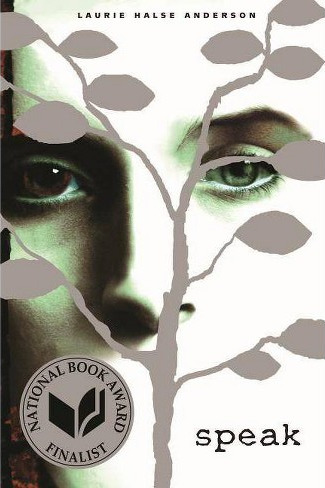
I’ve presumably owned this book for a few years now, although I don’t remember buying it. It has a Bargain Priced sticker from Books a Million, and another regular price sticker, denoting it as (being bought for) $4.97. I think I chose this book mostly because I was looking for a short book to read for this month, and it just happened to sound interesting as well.
The premise is that Melinda is a high school Freshman who is an outcast after having called the cops on an end-of-the-year party where she was raped by a high school boy (she had just finished eighth grade at this point), Andy Evans. Following this and being unable to tell anybody about it, she’s abandoned by her friends and blamed for ruining the party. She’s briefly able to make friendly-enough with a transfer student named Heather when ninth grade starts, but is eventually abandoned by Heather for having no drive and not being popular. Melinda’s grades are in the gutter, her parents are tense, and she’s all alone, her only comfort being in her art teacher, Mr. Freeman’s, class, and in her special hiding place, a forgotten-about janitor’s closet. Over the year, she’s able to come to terms with what happened to her, as well as start to get closer to one of her old used-to-be friends, Ivy. When Andy starts dating Melinda’s used-to-be best friend, Rachel, Melinda tries to warn her, luckily resulting in Rachel ultimately backing away from him (although she blames Melinda at first in her shock) and arguably saving herself from the same fate. In his rage, Andy tries to get his revenge on Melinda by raping her again, but she’s able to fight back this time and stop him.
Right off the bat, pretty fantastic book. I don’t know if it’s the best one I’ve read this year, but it’s certainly up there. I really appreciated how realistic it was with the way the high schoolers and teachers were written, as well as how Melinda felt, acted, and thought after the rape. It really did feel like it “got it”, you know? What it was like to be a teenager and have the whole world crashing down around you.
There were a few things that kind of stood out in the book as being different from when the time the book was written to now. For one, there was a joke about “the cheerleaders getting group rate abortions before prom”, since Roe v. Wade was overturned this year. The joke still lands, because cheerleaders are the most likely to have parents who could buy them abortions, although it’s interesting to see how the joke has morphed from the time it was written. The second joke, which isn’t technically a joke I suppose, was when Melinda mentioned that people might think she’s the type to show up at school with a gun one day. Obviously not a joke, but very realistic; I remember thinking about students who I thought might bring a gun to school, too. There were a few times I even thought about it (not that I had access to a gun, and not that I ever actually WOULD have; it was just a dark little thought to tide me over the sea of hormones).
I really loved the writing style of the book. It was good at suspense,especially when Melinda wanted to talk to Rachel and tell her the truth. The passage of time being marked by outstanding events because that was the only thing that you really took note of as a depressed teenager, the way things were emphasized, the way Melinda thought, the way she thought about her trauma in particular, etc etc. It was a really enjoyable writing style, one which was never too long winded and which made it easier for me to actually want to read more. It was probably one of the most realistic high school books I’ve ever read. A quote from the book I really enjoyed: “Is there a chain saw of the soul, an ax I can take to my memories or fears?”
I was really intrigued by Melinda’s parents’ relationship. I kept thinking that they would get a divorce at any point in the novel just to add to it, but now I wonder if most of the pain wasn’t just because they didn’t recognize their daughter anymore and didn’t know what was wrong or how to help her. That said, it’s not like they were the parents of the year, either- when Melinda cut herself, her mom said that she “didn’t have time for it”. Heartbreaking, especially to a girl who had almost nothing to lose. I genuinely thought that a failed attempt might have been the catalyst for the truth coming out, but luckily, she never tried. It was nice, however, when Melinda often thought about telling her parents, usually when they showed that something was there- love, maybe, or understanding. I understood why she didn’t, though.
This book had a really good way of making you expect the worst every time something good happened. Like when Melinda became friends with Heather, and then Heather ditched her. When Melinda tried to do a good deed, and it backfired on her. Etc etc. When Ivy, one of Melinda’s old friends, started talking to her again, I was afraid that Ivy was going to tell Rachel and it was all going to start crumbling down; thankfully, that didn’t happen.
Melinda’s relationship with her friends-not-friends was interesting. With Heather, Melinda implied that she was annoyed or not really interested with her companionship for most of their friendship, right up until Heather wanted to break it off, which is when Melinda was suddenly more interested in it than anything else (understandable, since she suddenly realized she would be all alone). In the end she realizes that she and Heather were both just using each other for companionship, not actual friendship, and Melinda was able to turn down Heather crawling back to her at the end of the novel when she needed help decorating the gym, which I was proud of her for doing. With Rachel, her used-to-be best friend, Rachel blamed her for the party getting ruined, even mouthing at Melinda at one point that she hated her. Despite that, she still believed Melinda in the end when Melinda told her the truth, ultimately saving herself from disaster. With Ivy, Melinda was friends with her but it wasn’t a huge loss, either, which is why it was surprising but nice when Ivy was the first one to try to become friendly with her again, complimenting her, listening to her, and helping her. With Nicole, they weren’t very close friends, so it wasn’t a loss to either of them, but they never really tried to reach out to each other, either, which wasn’t a big surprise. David, Melinda’s lab partner, wasn’t necessarily her friend, but he was nice to her overall and even invited her to a get-together at his house (which she declined), and who stood up for her against the mean Mr. Neck, but neither of them really made any attempts to be very friendly together. Overall, it was just an interesting view of the different dynamics of the friendships.
I was glad, in the end, that Melinda was able to get some catharsis and was able to save herself. I was surprised that she never actually told anybody (or, at least, she only told her art teacher? I wasn’t really for sure about it), but that in itself was a realistic ending, too. The summary of the book mentioned that after she told the truth “everything would change”, which I don’t think is true, exactly. Things DID change, yes, but they were changing before she told Rachel, too. The only thing, I think, that really changed was the fact that Rachel was reaching out to her again afterwards (after she had some time to process and started to believe her). In a way, I’m glad that everything didn’t suddenly change - I’m not sure Melinda would’ve been able to handle it if they had suddenly changed all at once. Instead, the change happened gradually, which allowed for a pretty shitty school year, yes, but which also allowed her to change and grow with it. I was proud of her progress at the end and I hope that the coming summer was better for her. I hope everybody believed her. And, although she missed Rachel most of all, I kind of wish Ivy became her new best friend, haha.
Not of any import to the book itself, but the art project assigned by Mr. Freeman, the art teacher, reminded me of the art project the teacher from the book Heartbeat, by Sharon Creech, assigned, about drawing an apple every single day. In this way, the way the students changed and how their art reflected it was a really interesting thing to do. I wonder if that was a real art project any high school teachers have done before? Man, I really want to read that book, now. Did I ever even read it in full? I can’t remember. I’m pretty sure Megan showed it to me, though, and I remember reading part of it, at least. Need to get my hands on it at some point.
Really a fantastic book overall. Very enjoyable. Pretty heavy subject-matter wise, so it’ll definitely have to be a while until I read it again, but I wouldn’t mind reading it again, which I count as a win. Definitely a keeper. 5/5.
My bookmarks for this book were a dark brown paper wrapper from a Ferrero Rondnoir truffle and a white paper wrapper from a Raffaello truffle.
0 notes
Text
Ben 10: The Creature from Serenity Shore
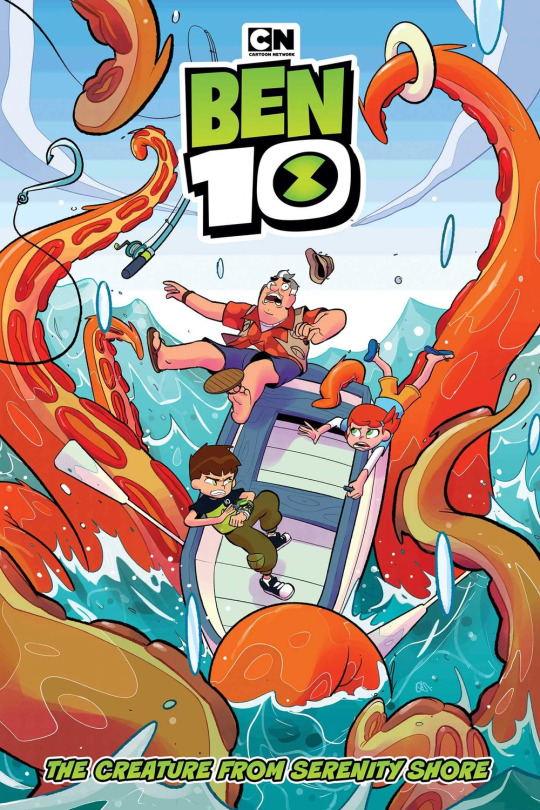
I don’t own this book, but rather borrowed it from the public library after noticing that it was there.
The premise is that the Tennysons have gone to Serenity Shore, a beach, to enjoy fun summer activities. While there, they learn that Crystalis squids are disappearing, a local squid researcher is missing, and the coral reef is being damaged by the lotion factory nearby. They work together with some locals to uncover the truth behind the squid disappearances and what’s ruining the coral - Dr. Animo! He’s taking all of the squid in an attempt to mutate them into the perfect lifeform, modeled after a squid he mutated using anglerfish and whale DNA. Ben, who is terrified of tentacles, has trouble fighting this monster, freezing up twice while trying to fight it, but he refuses to talk about this to his cousin or grandpa. It’s only after he learns that it’s okay to be scared that he can fight the creature, demutate it and the others that Animo has experimented on, save the missing researcher, shut down the factory, and arrest Animo, with help from Gwen, Max, and the locals.
It was alright! Not my favorite out of the four I’ve read, but it was still pretty good. I thought the design for the squid creature was really cool, and the colors were really nice throughout the book. The art style was only okay. I REALLY loved Ben being afraid and trying to keep it all to himself, and it was also really cool to see him work in spite of that fear anyway! Plus, the story was a good way to teach kids about pollution and coral reefs.
Below the cut is some pictures I took while reading.
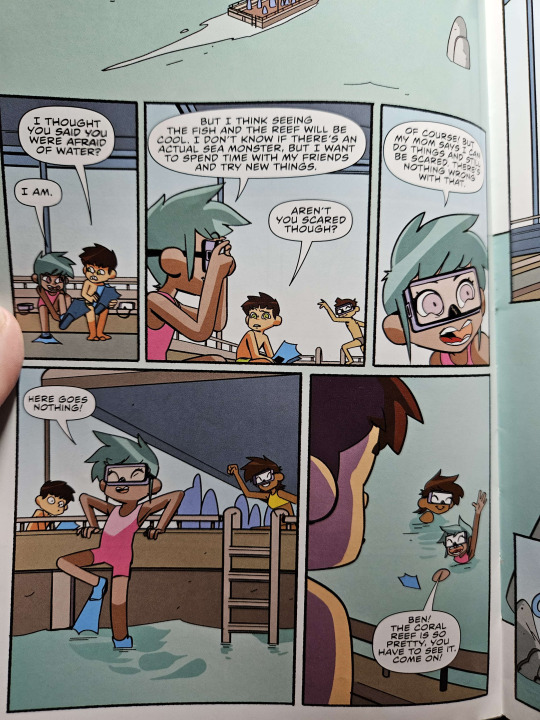
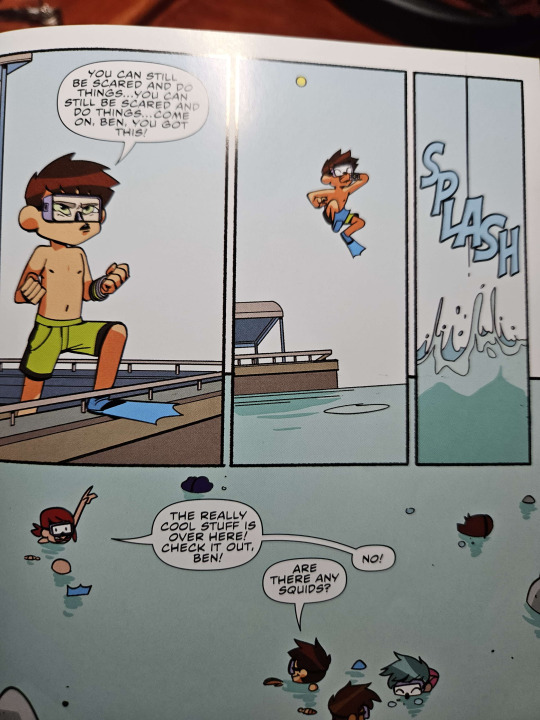
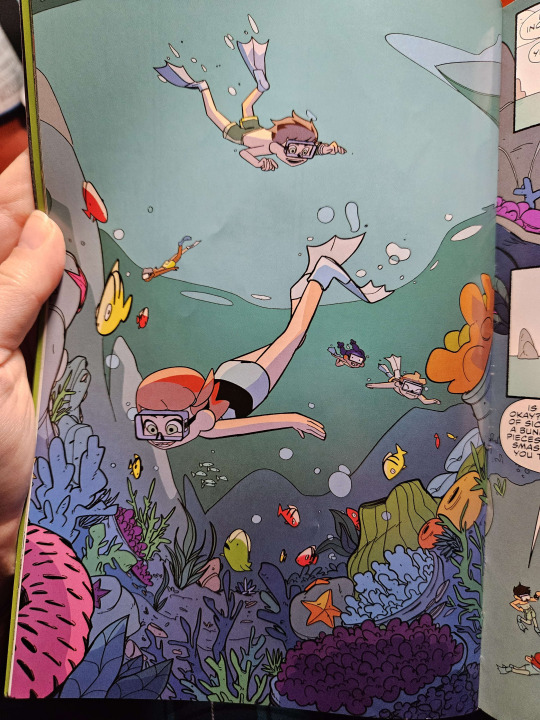
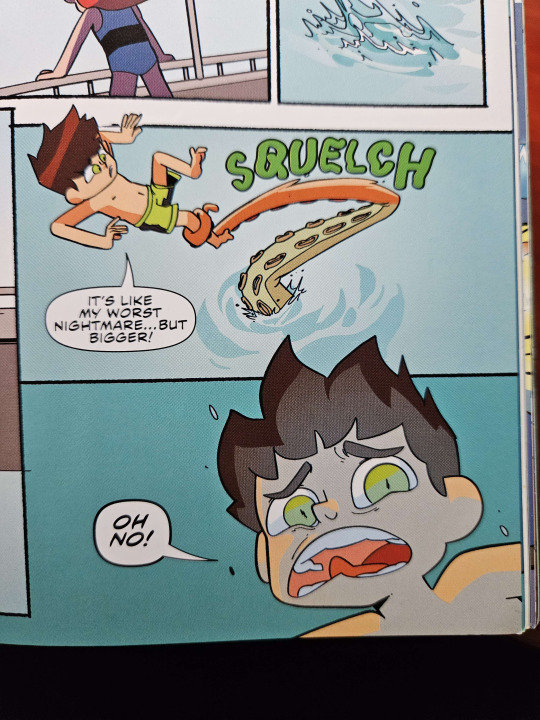
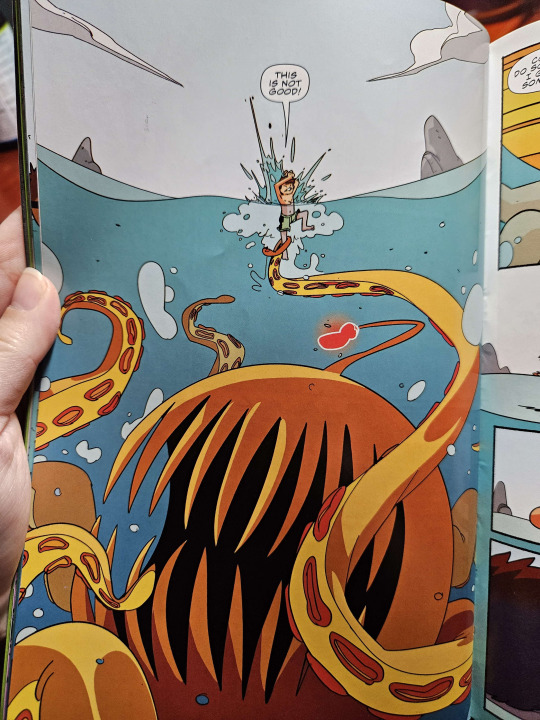

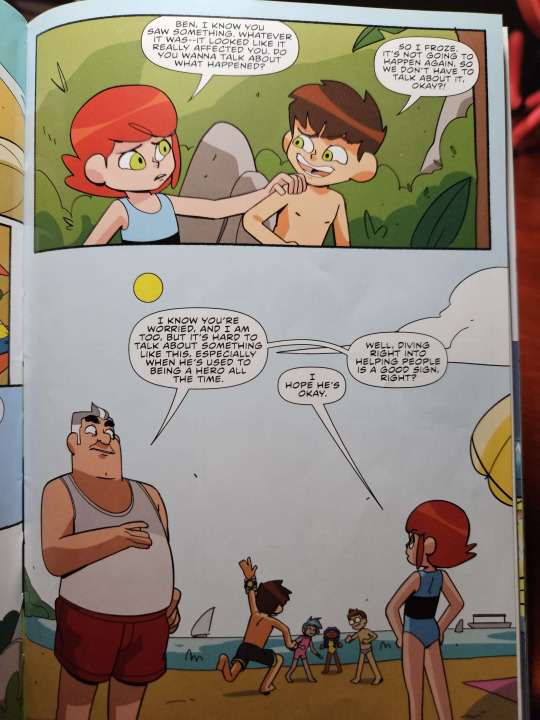

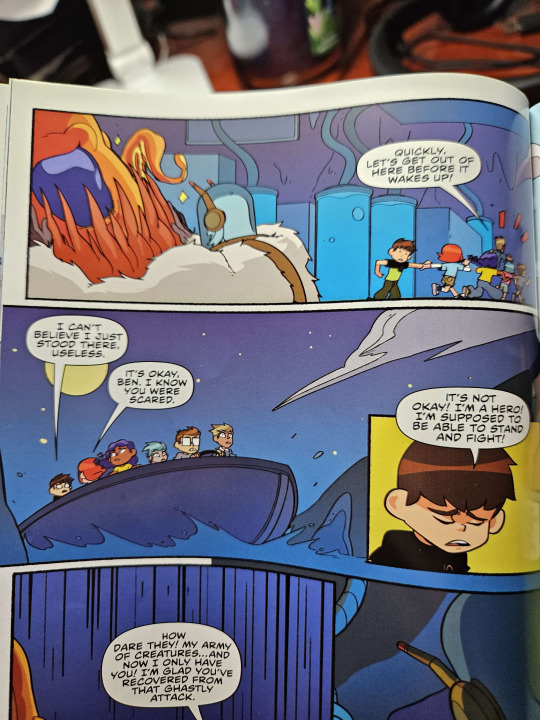
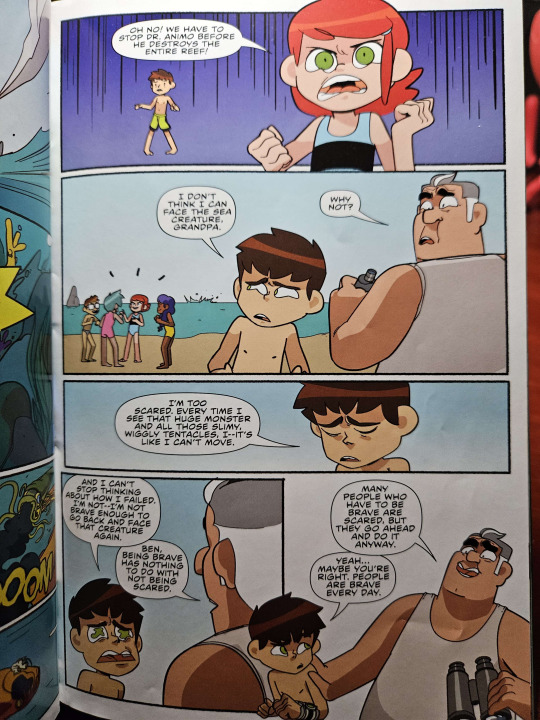
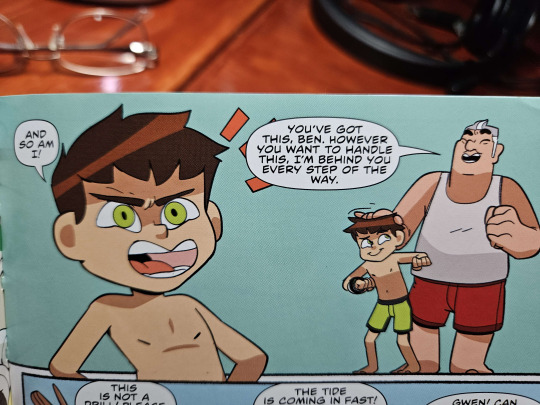

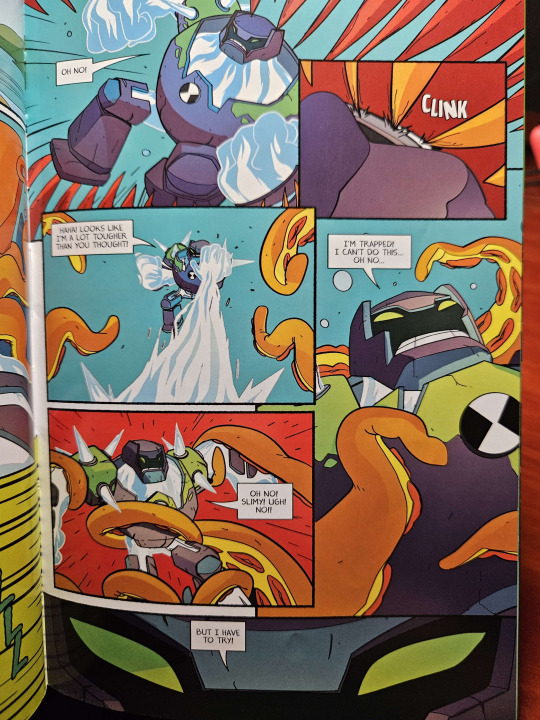
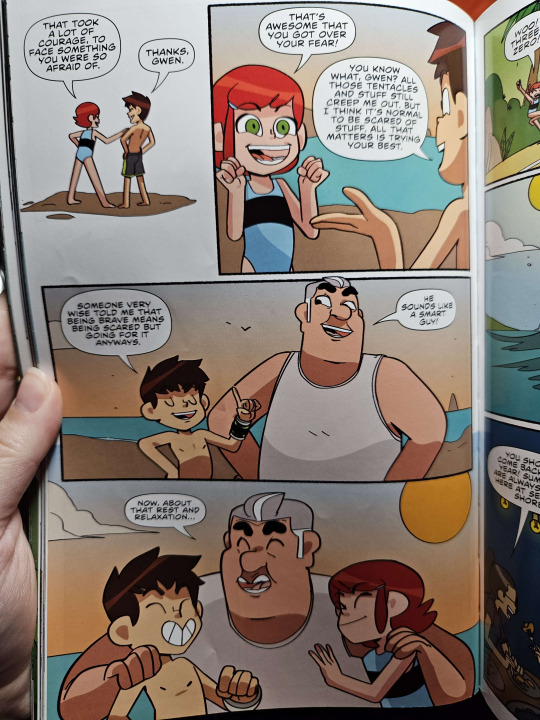
0 notes
Text
Ben 10: The Manchester Mystery

I don’t own this book, I rented it from the library after I saw that they had it.
The premise is that the Tennysons are in an old timey tourist town which has been losing out on money because tourists aren’t interested anymore. While in town, Ben waits for his favorite Youtubers, The Mystery Boys, to announce the winner of a contest, the prize being a chance to guest star on an episode alongside them. While touring the mysterious Manchester house, Ben, Gwen, and Max learn that things have been mysteriously disappearing and things have been moving on their own. At the same time, The Mystery Boys are also there, recording their own video. Ben learns that their videos have all been fake, but the Manchester mystery is very real, because Hex is there, too! Hex has been the one behind the mysterious phenomena in the house recently - he’s trying to find the locket, goblet, and mirror necessary to reawaken the Beast of Manchester, a terrifying monster that can’t be stopped and which, if controlled by Hex, could lead to Hex’s world domination. Although Hex is able to summon the beast, the Tennysons and the Mystery Boys are able to beat the beast and best Hex to save the day!
Very cute story. Pretty interesting, although very wordy, more than I expected from a children’s graphic novel. The art was really charming, very cool! I do think The Mystery Boys should’ve faced consequences for misleading their viewers, and also for setting Ben up for humiliation, but I guess there’s only so much time in the day.
Below are some pictures I took while reading it.

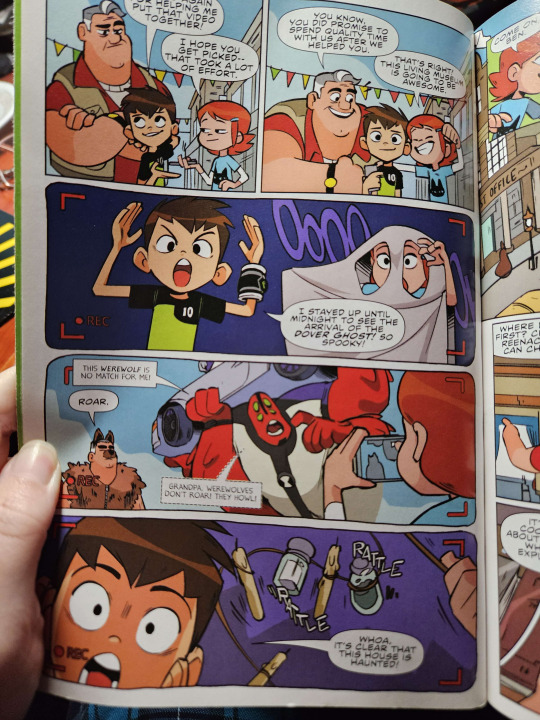
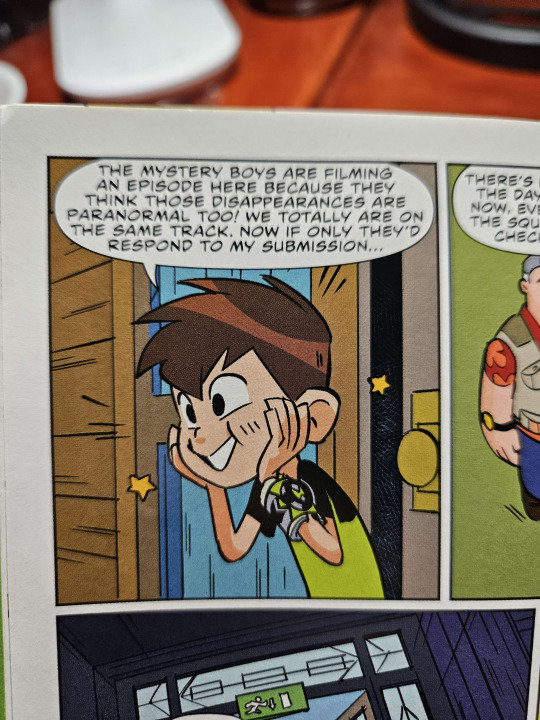

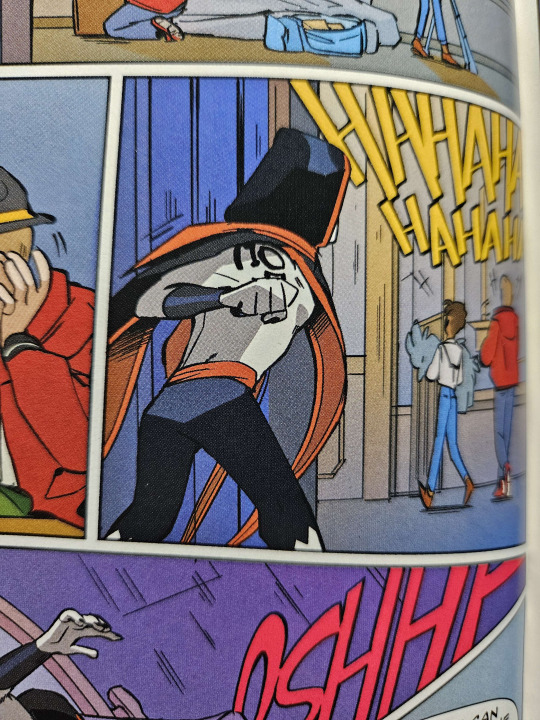



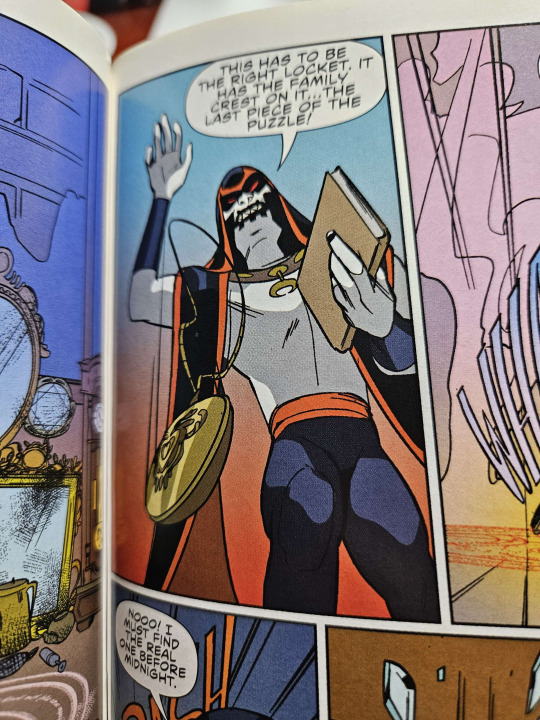
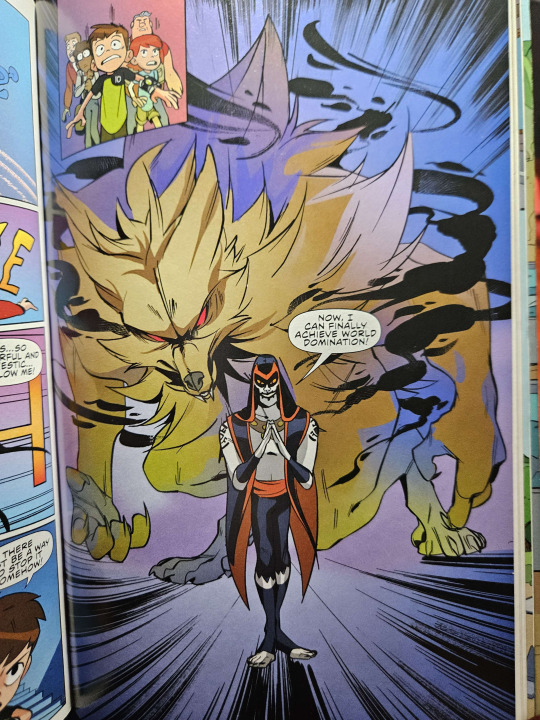
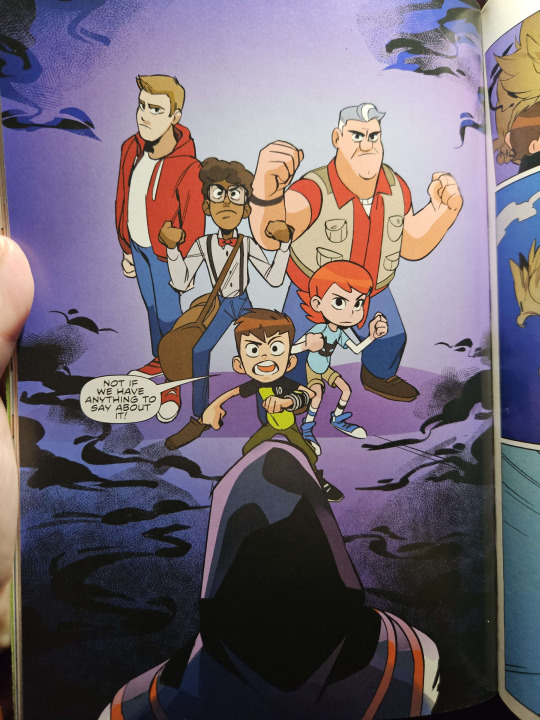
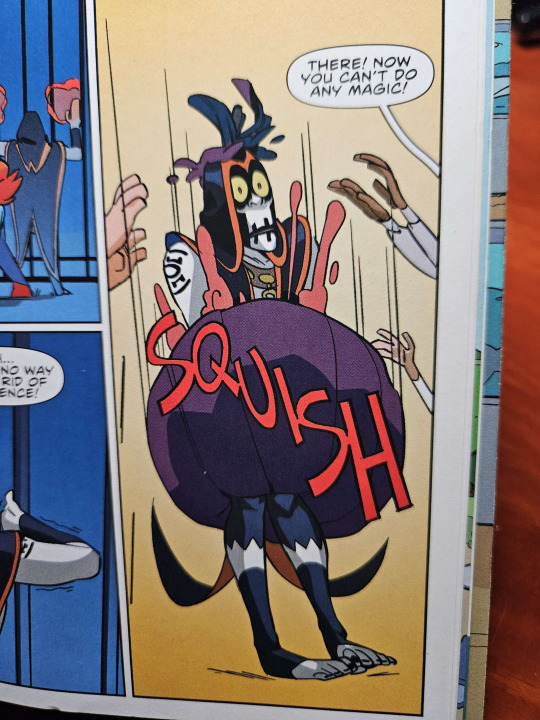
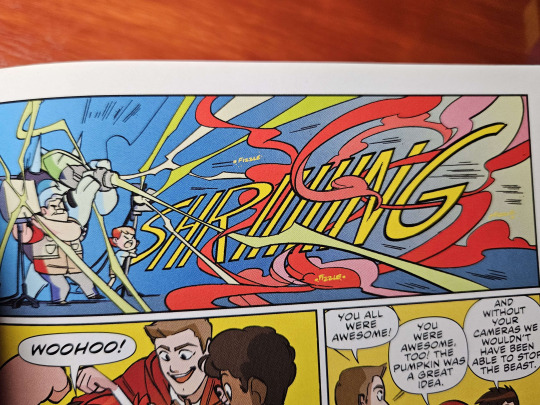
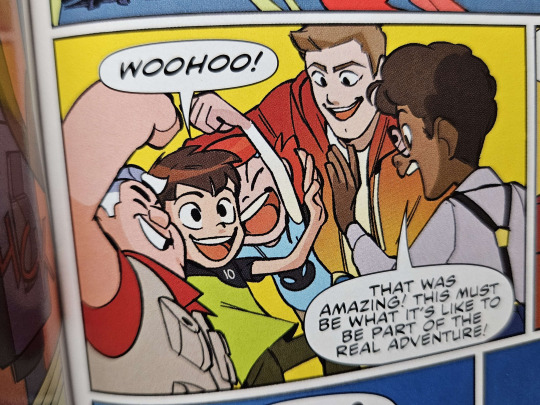
I think Ben had a crush on the Mystery Boys, and also that the Mystery Boys were gay.
0 notes
Text
Ben 10: For Science

I don’t own this book, but rather rented it from the public library after realizing it was there.
The premise is that Ben and Gwen go to Stars Beyond, a weeklong science camp, to investigate an urban legend, a huge metallic monster with glowing eyes that’s been seen at the camp in the past. While there, Ben and Gwen both enjoy learning about science and robotics while uncovering the truth of the monster - a robot that has evolved past normal robots, and who now takes in damaged and broken robots to repair them! They learn that this robot has a virus infecting its system, so they delete the virus, and then the robot is given a new home at the camp, while Ben and Gwen go on their way to explore more legends.
It was super cute! I thought it was a really cute detail how Gwen was more interested in the legend, whereas Ben got really into the science and experiments, even though he originally thought it was going to be boring. It was also cute how they helped out the big robot in the end. All in all, it was very sweet!
Below are some pictures I took while reading.



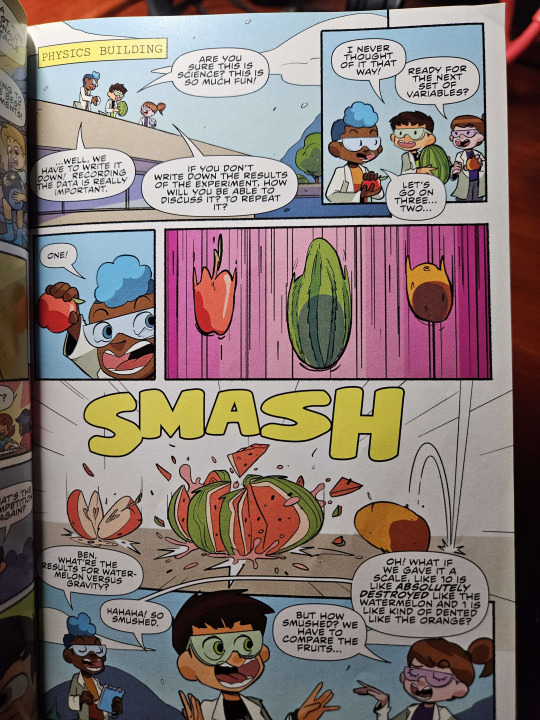



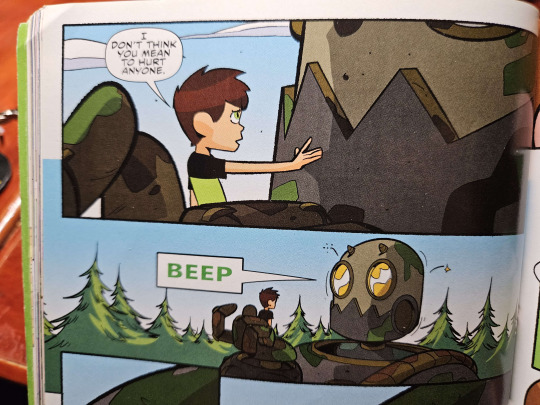

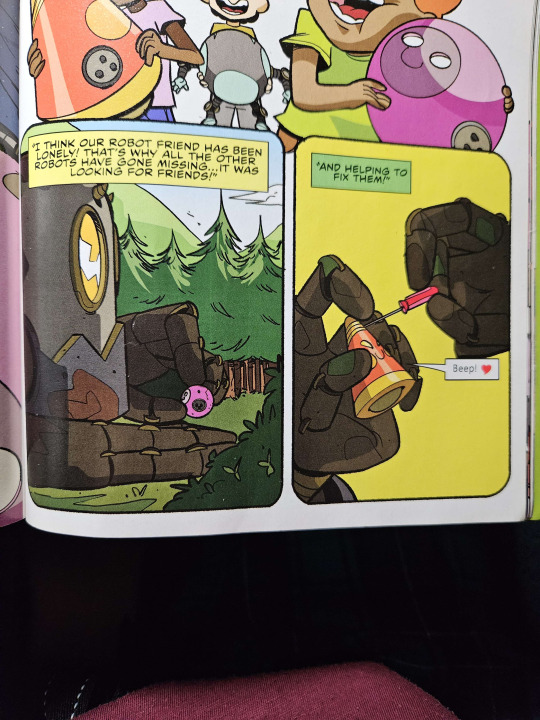
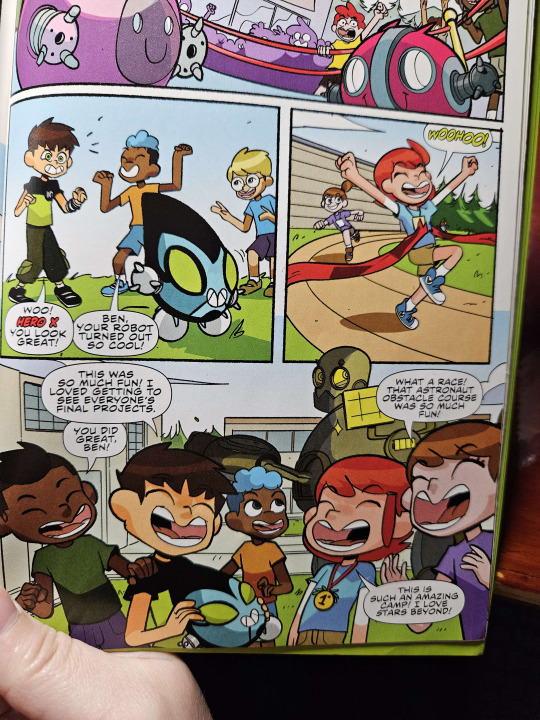

Note: when the robot is speaking in binary, it’s saying “Please help I don’t know what’s happening it hurts”
I think Hector had a little crush on Ben.
Again, probably won’t add this one to the rank list at the end of the year.
0 notes
Text
BEN 10: Mecha Madness
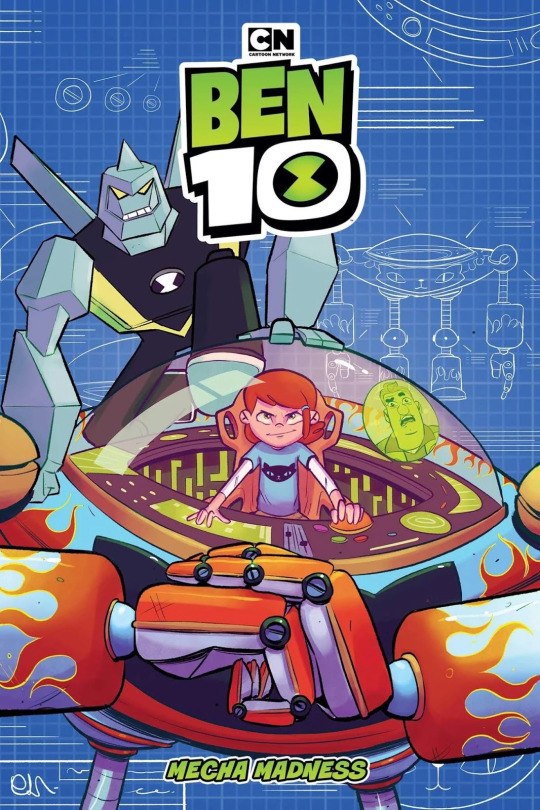
I don't own this book, but rather rented it from the public library after just happening to see it on the shelf while I was there one day.
The premise is that Gwen, feeling like she isn't being listened to and feeling undervalued and underappreciated, finds a mech suit that Steam Smythe built, and decides to fix it up and use it to help with hero work. She and Ben butt heads while she does heroics alongside him. They have to work together to defeat Smythe, although this proves troublesome until they have a heart to heart talk. In the end, although Gwen loses the mech suit, she and Ben have a better care and appreciation for each other.
I'm writing this review almost a full month after I read the book, so truthfully I don't remember very much. What I DO remember, however, is that the story was very cute and the art was very charming. There were plenty of adorable moments that I greatly appreciated. Although I would've preferred to see Kevin at some point, I still enjoyed it for what it was.
Very cute book which I don't think needs to be included in the end of year summary for anything more than quantity numbers. I would give it 10/10 (lol), but I don't think it needs to be ranked alongside the other books I've been reading this year.
Below I will include some pictures I took of the book while reading it.


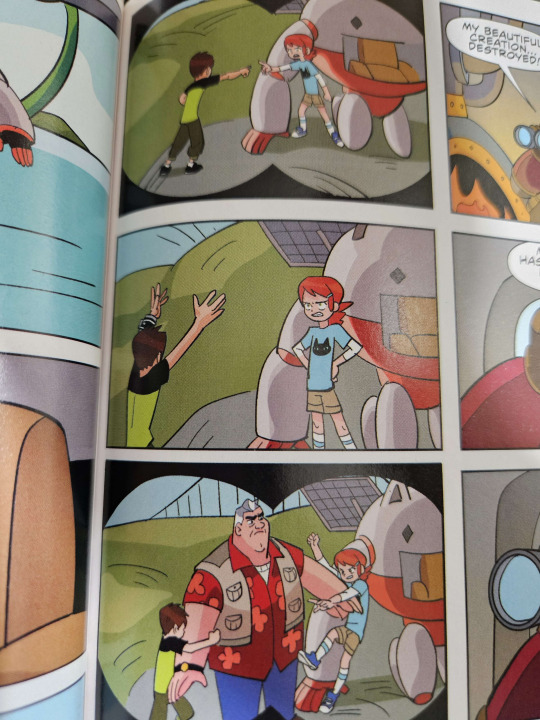
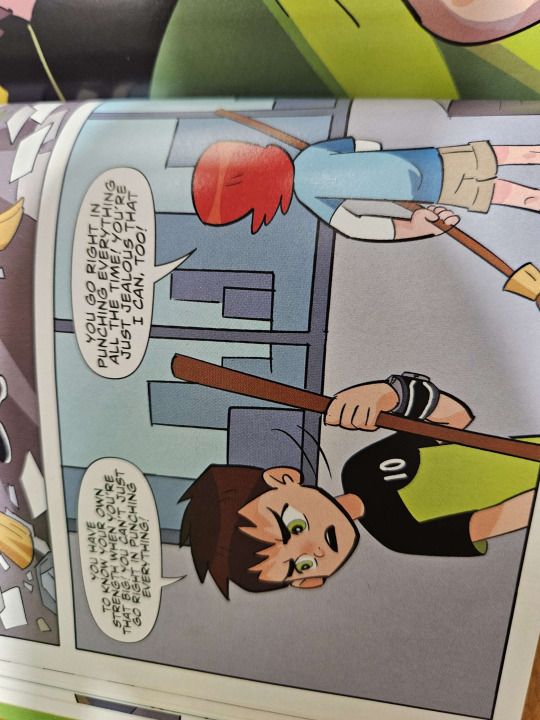
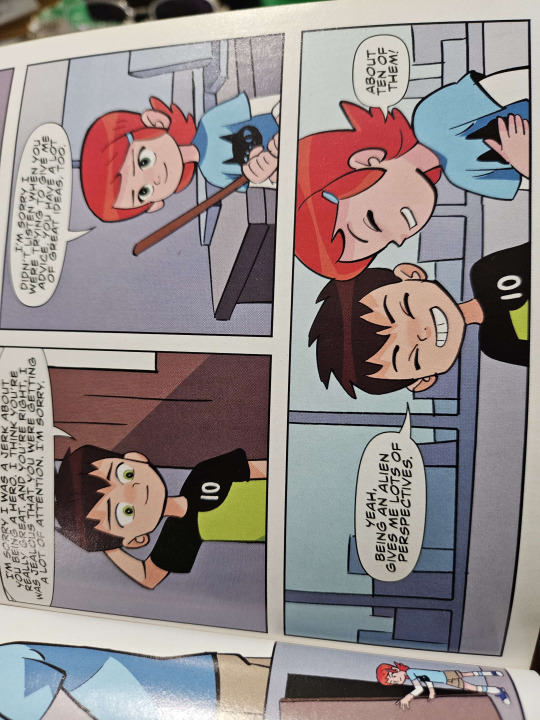

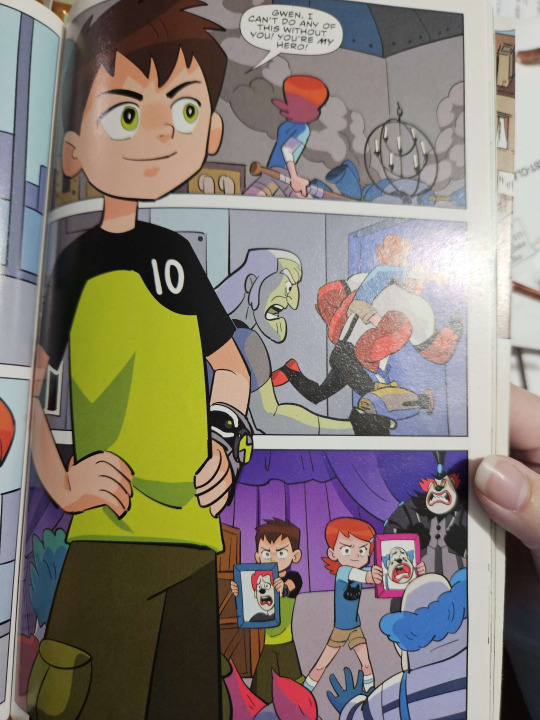
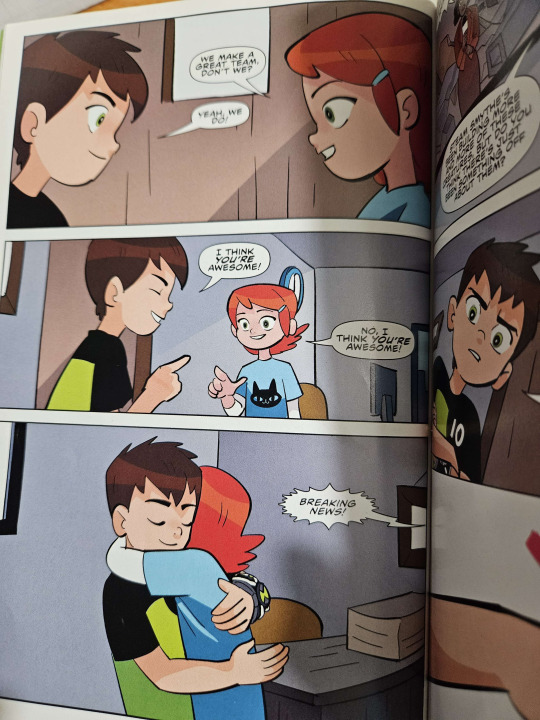

0 notes
Text
This One Time With Julia by David Lampson
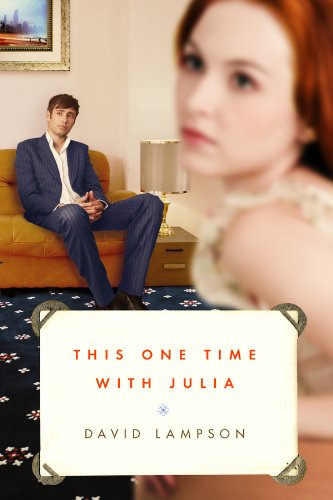
I’ve presumably owned this book for a few years now, though I don’t remember buying it. It has a Quality Guaranteed sticker and a price tag from Hastings for $4.49. I think I chose to read this book because the synopsis sounded interesting, but I don’t remember for sure.
The premise is that Joe has been living his entire life on standby, usually listening to and doing everything his twin brother, Alvin, tells him, or else just drifting along in life. One day, Alvin leaves to be with his girlfriend, Julia, and Joe spends his time gambling away his money while staying with his older brother, Marcus, who raised both he and Albin after their parents died. Alvin returns with plans to sail the world with Joe, but then, the next day, he disappears again, and Joe meets Julia. Just like his brother, he falls in love and follows after her, spending the summer with her, experiencing things he’s never done before, meeting new people, and becoming a new man. However, questions left unasked will return with answers, no matter how badly Joe doesn’t want to know them, chief among them being just what happened to Alvin, and what will become of Joe and Julia’s relationship.
This book is written in a decidedly charming fashion. We’re reading Joe’s thoughts and actions, and he has a very endearing and simplistic way of seeing the world. I was afraid that, over the course of the book, this would change as Joe experienced more of the world, so I’m glad that it didn’t. He might’ve gained more knowledge and experiences, but he stayed being good old Joe.
I appreciated the complexity of most of the characters. I appreciated the way Marcus held on to his plans and his dreams and his power with everything he had, because he lost it all when he lost his parents and he never wanted to lose it again. I appreciated how Alvin relied on Joe always staying the same so he would never have to face things changing, like after his parents died, and how he even worked to make sure Joe stayed the same no matter how things changed. I appreciated how Julia could only ever tell the truth in her sleep, and how Houston genuinely cared for Joe despite not regretting killing Alvin, and how Julia’s mom seemed to want to save Joe from the fate she found after marrying her (ex) husband, and I enjoyed how Joe, good old Joe, always went with the flow of things.
It’s interesting, the way the brothers lives played out. Like I said, it’s my understanding (though it was never stated) that Marcus was so reliant on his rules and his plans because his entire world was thrown out of whack with the death of his parents, and he resents his brothers because he had to be the one to take care of them, but he still loves them in spite of it, even Alvin, despite the way Alvin made Joe stay stagnant, and how he lashed out at Alvin because Alvin wouldn’t let Joe grow, and how he lashed out every time he lost a basketball game to Joe because he feels like he’s losing control again. And Alvin sabotaged all of Marcus’s attempts at getting Joe help or getting him to grow up, because Alvin’s life was thrown out of whack and everything changed when his parents died, so he tried to keep one thing the same forever. And how Joe stayed the same because it’s what Alvin wanted of him and because his life always seemed to work out in the end and it was easier not to know things than to know them. And in the end Marcus loses Joe but he keeps his plan going, and Alvin dies, and Joe has changed but he’s stayed the same in the end. And all of this because none of them were able to cope with the loss of their parents and none of them went to therapy. Julia thought that Marcus was too tough on Joe, but she didn’t understand just how desperately he loved Joe, and probably Alvin, too, and that’s why he had so many rules to help Joe, and why he got so frustrated when Joe didn’t listen.
There’s an overwhelming number of characters that could be considered manic pixie. You’ve got Joe, Julia, Alvin (arguable), and Julia’s mom. This isn’t a bad thing, just interesting. I guess it’s actually better to have your two leading characters be manic pixie, because at least that way they seem normal or the norm for the setting. Plus, it kind of makes it more enjoyable to read.
The fun thing about Joe is that he reminds me of myself, in a way. Generally, when a character reminds me of myself, I hate them. It’s just a fact of life. And, for the first few pages of the book, I hated Joe! But I really grew to love him. Maybe it was because, as the book went on, I related less to him, or maybe because he reminds me of parts of myself that I don’t hate as much as some other things, or maybe some other reason. Regardless, I really grew to love Joe.
I also wonder about Joe’s brain. See, Marcus says that Joe has some sort of attention disorder, which I could see. But I also wonder if Joe is autistic, too. He’s used the same bookbag for practically his entire life, he doesn’t like wearing new clothes, he immediately likes people who are nice to him, he has dietary restrictions, he has trouble focusing on the things he doesn’t care about, and so on.
I was surprised when Joe admitted that Alvin had tried to isolate him from everybody. I was surprised that Joe knew that Alvin was bad for him. It seemed, if Joe’s hallucinations of Alvin were any indication, that he knew a lot of things, but that he didn’t have the ability to really focus on them, which is why he relied on other people or his hallucinations to spell it out for him. And yet, I’m relatively sure that if Alvin had survived and asked Joe to stay with him, he would have. That’s the type of guy he was. And if it were between Julia and Alvin... well, I’m not sure. I don’t know. Probably Julia. But he would’ve gone back to Alvin in the end, because Julia would’ve gotten rid of him eventually.
I saw some similarities between Marcus and Houston. Not many, necessarily, but I saw the way that Houston genuinely seemed to care for Joe and want him to do better. They both had high hopes for Joe, they just went about it in different ways; Marcus didn’t really force Alvin to do anything, he just threatened and yelled, whereas Houston was encouraging and kind. Maybe Houston was what Marcus could’ve been with a bit of therapy, or with his life together.
I wish we knew more about Julia. I wish I knew why she had the nightmares about breakfast being made, and why she talks in her sleep. Does she overlook everything in her daily life on purpose? Is it a coping mechanism to protect herself from her family, from the sketchy business that goes on and the way Marcus cares about her and how her mom tried to burn everything down? In the end, I still never really understood her. I thought she was going to turn Joe in for killing Marcus, that kissing him and buying him cheeseburgers was just her last goodbye to him. Even now, I wonder if she didn’t go back home and phone the police, and now they’re looking for Joe. I just don’t know.
Another thing I have to give the author credit for, or maybe my own foolish brain, is the fact that I genuinely didn’t see the twist that Houston was the one that killed Alvin coming. I don’t know if I missed any signs, or if it was obvious to everybody but myself, or what, but I was genuinely shocked. I was also surprised that Marcus liked Julia. I had never noticed it, just like Joe. I hadn’t ever really gotten that vibe between them, but maybe I just overlooked it because I didn’t expect it. Even more than Houston killing Alvin, the biggest shock was the fact that Joe actually killed Houston in revenge. I was SCREAMING (metaphorically) when it happened. I thought, when Joe was still being friendly with Houston, that meant that he wouldn’t get revenge, that he wouldn’t do anything in the end, so imagine my surprise when he DID. And my heart kind of broke when Joe thought Houston would be one of his hallucinations, just like Alvin. I also was kind of surprised that Julia
I liked the way the characters in the book cared about each other. Marcus, despite having been angry at Alvin for years, got Alvin an urn painted like the ocean, because he knew Alvin loved the ocean. Joe was so rapturously happy that Francisco kissed the girl in the end that he was smiling ear to ear. Houston didn’t hold Joe’s lack of knowledge over anything against him. All of it was very endearing.
Biggest problems with this book for me were, first, the cover (I hated it. I didn’t imagine Joe nor Julia to look like that at all. I never looked at the cover if I could help it), and two, the ending. I didn’t hate the ending, but I wish it wasn’t so open ended, or else I just can’t stop thinking about it. I’m afraid that somebody will turn Joe in, I’m afraid he’ll stay on the street forever, I’m afraid of all of it.
Three quotes from the book that I really enjoyed:
- “I just tried to lecture you on outer space,” he said. “So I must be twelve or thirteen years old. That’s the age where a boy reads a general-interest physics book, and then can give himself a fever just by pondering how small he is compared to the findings of science. The sheer intensity of my dreams and ambitions at this age was sometimes enough to make me cry.”
- "Let's just say that if this isn't love, then I'd trade love for this."
- "Losing a girl isn't the end of the world. It only changes your whole life."
MAN, what a book. Candidate for best book I've read this year so far. Bittersweet ending. Maybe it should be fully bitter, because his entire life has crumbled, but he's so... bright. Optimistic. It can't bring him down. I don't know. It was good, in the end, even when it was bad. He fell in love, he got a job, he learned to swim, he got revenge, he lost his girlfriend, and then he talked to a pretty girl. I hope things buck up for him. For both of us. I'm cheering you on, Joe.
Really good book. Probably the best I’ve read so far this year. First book I’ve read this year that I want to immediately reread, just so I can pick up on everything I missed the first time. 5/5.
My bookmark for this book was a neon yellow-green ribbon that was knotted at both ends.
0 notes
Text
Arclight by Josin L. McQuein

I’ve presumably owned this book for a few years now, though I don’t remember buying it. It has a Used/Quality Guaranteed sticker on it and a Hastings price tag indicating I bought it for $8.99. I chose to read this book I think because the cover was nice and the synopsis sounded vaguely interesting.
The premise is that the Arclight is one of Humanity’s last strangleholds against the forces of the Fade, a hivemind of nanite-infested used-to-be humans. Marina, the protagonist, came from the Grey, an area in the no-man’s-land between the Arclight and The Dark, the Fade’s home. She lost all memories of her time before she came to the Arclight. The humans are scared of her and many of them dislike her because some of their own were lost in the expedition to save her. Marina’s life is turned upside down after the Fade invade the Arclight one day. One Fade boy, named Rue, takes her to The Dark, where she learns that, not only do the Fade not wish harm on the humans, they just don’t understand them, but also that the believed-to-be-dead members of the expedition party are actually alive and were saved by the Fade. Marina slowly gains back her memories, learning that not only did she come from The Dark, but she was a Fade as well, and she now has to choose between going back to the home she remembers to save The Fade from the Arclight humans, or to stay with The Fade and attempt to recapture what was lost.
Right off the bat, I need to say that this book was frustrating in a few different ways. It started off by dragging the reader along as though we already knew everything, which is a pet peeve of mine, and it took its sweet time to explain to us what we needed to know. It pushes the most convenient romantic relationship onto us, even though it makes no sense from the information we are told. The main character seems resistant to change. The main character’s best friend barely gets any time, even though the main character talks about how important the best friend is to her at least once or twice. We’re given a love triangle that never even lets the second love interest get a foothold. The villain of the novel is just... ignored at the end, rather than being dealt with in any sort of way. The entire book, overall, can be described by one word: unsatisfying.
We’re told right off the bat that Tobin hates Marina for being the cause of his father’s death, and yet they’re pushed together almost immediately. She stops him from fighting by kissing him, he tries to save her life, they get incredibly close in the span of a few days, it’s all just so miserable. They don’t make any sense. It was more interesting when Tobin hated her and blamed her for his dad dying. It would’ve been better if they didn’t like each other for longer, if the hate had festered. It’s okay to let it fester. That makes it more interesting.
It felt like we never had enough time with the side characters, any of them, besides Tobin. Marina explains on two different occasions how important Anne-Marie (Annie) is to her, yet we hardly ever see them talk, to the point it feels ridiculous that Annie even went into The Dark to save her with Tobin. Or, at one point, Annie’s mother blames Marina for her daughter having been in such a dangerous situation, but we feel completely neutral about the entire event because we don’t know what she’s like normally. Mr. Pace seems to genuine care about his students, but we only see him in passing. Mr. Wolff, the doctor, seems like a kindhearted man with a genuine interest in Marina, but we only see him briefly. Honoria, the villain of the novel, is probably the most interesting character in the book, being almost as old as the Arclight itself, at least a hundred years old, if not having been around for the end of the world (I can’t remember), the nanites took her brother, she was infected and could hear the voices of the Fade, and she hated them so much that she burned the voices out of herself, even though she still saw her brother, and yet we don’t have enough time with her. She’s so interesting that she steals every scene she’s in, yet her scenes are so few that I forget so much about her.
Anne Marie deserved better. She was constantly kept in the dark throughout the novel, up until she runs into The Dark to save Marina. She isn’t told the truth about her brother, she isn’t told about The Fade because she’s a worrywart, nobody ever confides in her... we’re told that she and Marina are best friends, but we never actually SEE it. I would rather have put the love triangle on the backburner and focus more on their friendship, with Marina learning that she can confide in and trust Annie, etc.
One nice thing about the book is the ignorance the characters have of life before The Fade. They’re about six generations removed from that world, so outside of Tobin’s mom’s artifacts and Honoria, nobody really knows about what the world was like before. It was an interesting bit of worldbuilding to have it so that the characters didn’t even know about shooting stars, because they aren’t really able to see them at night thanks to the lights around the Arclight.
The pacing of the book was weird. We only learn that Marina and Cherish, Rue’s girlfriend, are the same person in, like, the last quarter of the book, maybe the last fifth. It would’ve been more rewarding to learn that slightly sooner, so Marina could commit to wanting to help the Fade faster, and even the love triangle could’ve benefitted from it.
The Fade themselves are interesting. I appreciate their ability to mimic their surroundings and I think it’s cool how they’re a hivemind and I think it’s interesting how they don’t need to speak out loud to talk with each other, instead communicating in thoughts and emotions. It was cool in The Dark how they all closed in around her, how she was overwhelmed and almost overtaken by them. It was cool how they saw the humans who they healed as being part of the hive, even though they couldn’t communicate properly. It was cool how the hive healed them, even though they shot at each other.It was an interesting choice, having them able to reproduce organically. I think it would have been better if they could only reproduce by overtaking humans, but it makes sense that biologically they would be capable of it, considering human is their model and they can overtake humans as well. It’s cool how those born as Fade can disperse into nanites to get through small cracks and things. It’s cool how the search party people are, like, half Fade thanks to the nanites in their bodies saving them and keeping them alive. It’s cool how the nanites were the only thing keeping Tobin’s mom alive.
Another thing I thought was interesting was, firstly, Marina learning she was Cherish, and secondly, the origin of her name. I had guessed Marina was some sort of Fade hybrid early into the book thanks to her physical description (white hair in particular), but I hadn’t expected her to actually be Rue’s Cherish, which was a cool twist. I only wish they had done more with that, rather than have her be relegated to a back part of Marina’s mind, practically inaccessible, all but locked away even after the truth was revealed, and never becoming a full part of Marina, joining the whole. I can’t remember if Rue tried to give her his nanites and it didn’t work, or if he didn’t try. I can’t think of any reason for it not to work, but I don’t know. I thought the reveal of the origin of her name was very interesting; Rue knew who she was the entire time, but lacked the ability to explain it to her. He was very adamant that she was not Marina, not dead water, but he couldn’t explain what he meant. I thought Marina knew that that wasn’t her real name, though? I don’t know why she was so shocked to learn that it wasn’t.
This book had a lot of REALLY CONVENIENT plot points. Tobin and Anne Marie just happening to be in The Dark when Marina woke up, there just happening to be secret tunnels in the Arclight, Tobin knowing exactly where to go in the tunnels, Marina and Tobin being under containment in the white room but nobody is watching them, and then being able to find the computer and access the files with ease, etc etc. It was annoying, I wish there was more conflict.
I hate that Marina named Rue, Rue. He settled on “Cherish” for the one he loved, but he was named sorrow/regret. I thought he was going to be named something like Dear, but no, Rue. And it’s so tragic, because he had so much love inside of him! And I just think he was the better love interest. Yes, once again, I choose the second love interest over the first. But, come on! He broke into the Arclight just to save her, and I think he also took it in stride better that Marina and Cherish weren’t really the same person anymore, and he loved her in spite of it, whereas it seemed Tobin refused to believe or accept that Marina was anybody BUT Marina, y’know? Rue and Tobin were both arguing over Marina and insinuating that she was wholly the version of her that they knew, either Marina or Cherish, but that she couldn’t be both. I should have been equally mad at them for this, but it felt more egregious from Tobin, because he hated the Fade so adamantly and refused to admit that she could be anything except her human self, and he was disgusted by her Fade side, whereas Rue at least tried to accept her Fade side even though he didn’t understand it. I wish that she had chosen Rue at the end. Honestly, Rue and Tobin hating each other was pretty annoying, too - vaguely understandable, at least from Tobin’s viewpoint of all Fade being the same and culpable, but Rue was especially hostile to Tobin, even after having gotten Cherish back. I know it was for the love triangle, but it just seemed so nonsensical on Rue’s end, he seemed like he should have been so above it, like his hate for Tobin didn’t make sense.
It felt like the revelation that Marina was a Fade, and also that she had Fade family, should’ve been bigger. Marina mentions the idea of a family multiple times throughout the book, always dreaming of returning to them, but then she finally meets her mom and her sister, and it just... is nothing? She yells at her sister, Blanca, and makes her cry, but Blanca still loves her, and her mom protects her once, but she still just leaves them in the Dark and chooses to stay in the Arclight, and she doesn’t even think about it? What was even the point of having them at all, then?
Again, in the end, the only thing I can say about the book is that it was unsatisfying. Honoria was never brought to justice, the Fade and the humans never united and became one, Marina chooses the Arclight and Tobin over her Fade family and the Dark, Marina never regains her lost nanites or her Fade ability, Tobin received the nanites, which was his greatest fear, but we never see the fallout and by the time we see him with them, he is well adjusted to them, the Arclight has supposedly already started changing, but the kids are still locked in the hospital ward in the end... It was just unsatisfying. It was disappointing.
The book was unsatisfying. It wasn’t worth the money I paid for it. I just can’t decide whether to keep it or donate it. Probably donate, right? 2/5.
My bookmark for this book was the slipcover flaps.
0 notes
Text
The 13th Reality: The Journal of Curious Letters by James Dashner
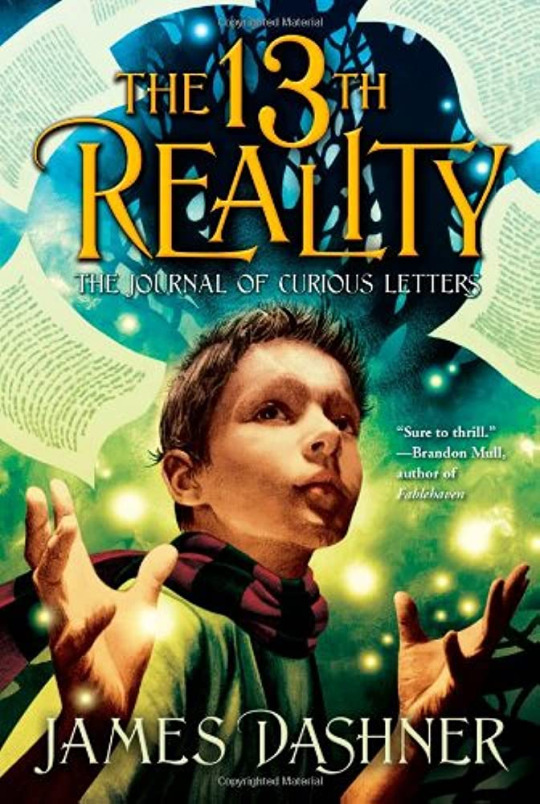
I’ve presumably owned this book for several years now, but I don’t remember getting it. There is no price sticker on the book, so I don’t know where it came from or how much it was purchased for. Maybe it was one of the advanced copies I got in junior high? I chose to read this book because I thought it could be interesting and I liked the colors on the cover.
The premise is that one day 13 year old Atticus “Tick” Higginbottom gets a mysterious letter in the mail, promising danger and adventure in the coming weeks and months, and that this can be circumvented by burning the letter, but at the cost of never finding out why the letter was written, or by who. Tick has to uncover the secrets of the letters to find out what’s in store for him so that he can eventually save his life and, potentially, the lives of everybody in the multiverse, along the way meeting new friends and making new enemies, all on the countdown to the coming adventure.
If there’s nothing else I can say about this book, I can at least say that it helped remind me that I prefer science fiction over fantasy - well, I suppose this book might technically fall into the realm of science fiction due to its multiversal happenings, but it’s written so whimsically that that much is easy to forget. Listen... this book was. Fine. I guess. But it had nothing great going for it. Nothing really stood out about it. Sure, it had interesting parts, but, like, the writing style wasn’t great, the characters weren’t particularly endearing, and the journey wasn’t particularly enjoyable. It was just... a very middling book.
While reading fantasy, it’s important to have a healthy suspension of disbelief. This is how you come to accept things like, for instance, being able to want something so badly you can alter a timeline just by thought, or by believing that preteens would be better for situations like this instead of adults. That said, some of the things in this book just couldn’t be overlooked. Mainly the fact that no children/preteens/teens have ever spoken Like That. I have to wonder if the author has ever been 13 or has ever met 13 year olds. I also have to wonder, based on Tick’s dialogue with his sisters (especially his older sister), if the author was an only child, because siblings Don’t Talk Like That.
In every book, I allow myself a sort of wishlist, you know, the things that I want to happen. In this book, I hoped that Tick would grow up to be gay. Now, there were a few things working against me - namely, the fact that this book was written in 2008, and the fact that it was written for children. I know that the likelihood of Tick growing up to be gay is highly unlikely. That said, since we never saw a glimpse into the future (at least, not in this book), it could happen! And I want it to happen, because from the way Tick was written, it’s apparent that he really idolizes the men in his life while simultaneously not caring much, if at all, for girls. Even Sofia, the girl who is the most likely one for him to be interested in, was very firmly just a friend to him. Compare this to Tick’s interactions with, say, Sato, and I have to say, I see more romantic chemistry there than with her.
I thought it was interesting how Tick opted to tell his dad everything about the letters. In most YA novels I’ve read, the protagonist doesn’t confide in their parents, and only occasionally in their friends, so the fact that he felt comfortable enough to tell his dad about what was going on was a really cool direction. That said, I kind of feared and kind of hoped that his dad would try to burn the letters when he learned about everything that was happening. I understand that he trusted his son, and maybe he thought Tick was the only person capable of stopping things, but... I don’t know, how can you see your child get viciously attacked by a swarm of metal gnats and then still send him on his way, y’know?
I guessed that the Mr. Chu from Chu Industries was an alternate version of Mr. Chu from school before it was revealed. Not much to say about it, just that I was proud of myself for figuring it out, haha. One thing to note, though - at one point, while Tick was thinking about the Chu Industries Mr. Chu, he briefly considered whether it were time travel, but dismissed it because he didn’t think Mr. Chu would travel back in time just to antagonize his students. I have to disagree. If he were one and the same person using time travel, then in the future wouldn’t he have known about Tick’s involvement working against him? Wouldn’t it have been far easier to travel to the past and make Tick trust him, just so he would have a chance at getting him to join him or, at the least, throw him off his game long enough to beat him?
I didn’t like how everyone was being so unfair to Sato. Why shouldn’t he be suspicious of everybody and everything? Tick, Sofia, and Paul all had the luck to find each other online, but Sato didn’t find them, so he has no reason to trust them. Plus, he was whisked away from his home in the middle of the night to a strange and dangerous new place. Isn’t that scary? Isn’t it understandable why he would react like a cornered dog? And, of course, that isn’t even to mention his past and his trauma surrounding Master George and his family’s deaths (I didn’t mention this part because the kids weren’t aware of it, either, so I won’t blame them for it).
There was one point, after everybody met up in the middle of the Bermuda Triangle, where Master George reveals that he was the one who set loose the Gnat Rat on Tick and played other tricks on the kids. The kids are, understandably, very upset and uncomfortable at this prospect, and voice their discomfort, only for George to belittle them for it. He explained that he only did it to weed out the people that couldn’t handle it, but, I don’t know, the fact that he screamed at them over it and tried to make them think it was completely understandable and reasonable to attack children like that... I don’t like that. Maybe George is the lesser of two evils, but I still don’t trust him at all. This is a moot point, I’m sure, because I doubt in the future he reveals himself to be evil or whatever, but it was a part that sat uncomfortably with me and made me wish I could grab the kids and run away from him, because who knows what he might say or do if they did something he didn’t like?
At one point, Sofia, the rich and presumably white Italian girl, calls Paul, the black boy who doesn’t have money enough to buy a flight to Alaska (beyond that, we don’t know his financial situation), a “talentless bum in every reality.” I really, really didn’t like that. She also was very unforgiving towards Sato, the Japanese boy. I don’t know, I don’t think we had to have her being so mean to the only two people of color in the book.
I didn’t like that Sato chose to stay with Master George in the end. It felt kind of manipulative, George saying that he doubted Sato’s foster family would even notice he was gone. Sato accepted the invitation too readily, almost like he trusted George at that point, rather than wanting to stay close to keep an eye on things. I wish we knew more about Sato... and I wish he could get a therapist. At least he trusts Tick so much now, though. I thought it was sweet how comfortable he was around him after Tick saved his life.
At the end of the book, I wish all four kids had shown a possibility that they could control the mysterious new power, rather than just Tick. I know he’s the protagonist, but I hope it’s something that everyone can eventually harness.
One final thing I didn’t like about the book was the fact that Tick never dropped the nickname Tick and instead went by his real name, Atticus, and that he never stopped wearing his scarf, which covered his birthmark that he was embarrassed about. Earlier in the book, he had lost his scarf, but while sitting with Sofia, he realized he didn’t mind it, because she wasn’t treating him any differently, and he had explicitly thought to himself that maybe it wouldn’t be so bad to leave the scarf off, only to crush his own spirit and tell himself that he needed to keep it. And, of course, the nickname is terrible; it was given to him by his school bully and instead of retaliating against it or hating it, he just accepted it and wants everybody to call him by it? Isn’t that sad? Isn’t it sad that his self esteem is so low that he can’t lose his scarf crutch and he goes by the name of a disease-ridden, blood sucking insect? Shouldn’t he, as the protagonist, be allowed freedom from these after a time?
The book was... fine. That’s all it was. Not fine enough to be a true middle fine, but fine all the same. 2/5.
My bookmark for this book was a lime green ribbed ribbon with knots at both ends.
0 notes
Text
One of the Survivors by Susan Shaw
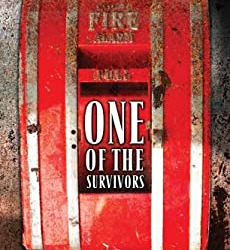
I’ve presumably owned this book for a few years now, but I don’t remember buying it. There’s a Quality Guaranteed sticker, as well as a price sticker on it pricing it at $3.49. I decided to read it because I wanted a short book I could read this month, since I knew I wouldn’t be up for reading for some time after having my gallbladder removed on the first of the month.
The premise is that teenager Joey Campbell and his best friend Maureen are the only two people in their entire history class who survive a fire after Joey, previously traumatized by fire, runs out and Maureen follows him. The story follows the aftermath and the lead-up to the funeral of their classmates, chronicling how they handle survivor’s guilt and the angry mob of people who believe that they were the ones that set the fire.
Honestly, it was a pretty simple book, but for the most part it was charming in how it handled and portrayed grief. Frankly, I didn’t keep notes for this book, in part because it felt almost wrong to (being of such a serious subject matter, regardless of being a work of fiction), but also because it just... didn’t call for it. There were very few things that made it stand out for most of the time. Charming as it may have been, it didn’t have much going for it.
I thought it was interesting how the reader was basically acting as Joey’s journal, at least given the point of view that Joey was writing from. I’ve always enjoyed diary/journal books, wherein events are described and we see completely and exactly how the writer of the entry (not necessarily the writer of the actual book) feels and thinks about said situations.
I appreciated how Maureen and Joey never started dating or anything like that. I knew it wasn’t that sort of book, but I’ve been burned by books before, books that had no business having some sort of romance but which shoehorned it in anyway, so I’m thankful that didn’t happen in this book and wasn’t even really hinted at it happening in the future.
One thing I didn’t like was the ending of the book. For the most part, I thought the book was pretty well paced, but the ending was too sudden; I think it would’ve benefitted from another 20 pages, at least, but maybe 30 or 40, just enough to pad out the ending. The entire story takes place over a few months in the summer following the fire of the school, allowing the characters to breathe and move and act organically, but the ending of the book felt rushed. Perhaps this was because the rest of the book moved at such a leisurely pace, but it just wasn’t a satisfying ending, both in regards to speed and also in regards to the characters themselves. It felt like they made choices that didn’t match up with where they were in the healing process, or else the characters around them didn’t react realistically to them. The grieving daughter of the teacher who died in the fire almost immediately believes the boy when he says her father was the one who kept them all in the classroom, even though it seemed like her rage was the only thing keeping her going. The parents of the dead teens and the community members all welcome Joey with welcome arms and apologize (?) to him after seeing the drawing that he did. I don’t know, it just didn’t really feel right. Plus, frustratingly enough, we never learned what the cause of the fire was. Of course, it’s a story about travelling through grief and survivor’s guilt, so the cause of the fire wasn’t really necessary, but it still would’ve been nice to know, y’know? If nothing else, I was glad that, in the end, Joey decided that he would no longer drop out of high school when he turned 16.
One thing worth remarking upon, even though it wasn’t intended by the author, was the fact that it was initially a surprise that the book was about a fire and not a school shooting. Though this should have been (and, perhaps for other people, was) obvious based on the fact that there was a fire alarm on cover of the book, school shootings are such a common occurrence nowadays that the title made me think of survivor’s guilt, which made me think about school shootings, completely overlooking the design of the cover. Hell, there were a few times even while reading the book that I had to remind myself that it was about a fire and not a shooting. The book was copyrighted for 2009, and although there were already school shootings back then, they weren’t anywhere near as commonplace, so I doubt the author had really had them on the mind when writing about the book. In one way, that is interesting, seeing how perceptions can change over time, especially within your own lifetime. In 2009, I would’ve been around 11 or 12, and if I’m remembering properly, I don’t think I really thought much about shootings at school; I wasn’t really aware of them, I think, until I was in high school.
Overall, it wasn’t a bad book. It wasn’t my favorite, but it was fine, for the most part, anyway. Not great, not bad. 3/5.
My bookmark for this book was the flaps of the dust cover.
0 notes
Text
Can You Keep a Secret? by various authors
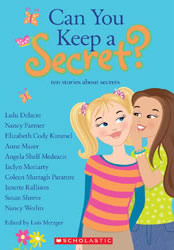
I’ve owned this book for several years, now. I believe I got it from a Scholastic Book Fair catalogue page. Presumably I thought it sounded interesting, but I don’t remember.
The premise is that ten authors wrote short stories themed around the prompt “secrets”. Every short story is centered around different characters, settings, and events, and with different morals.
I’m not going to spend a lot of time on this book, because I’ve read it several times over the years.
I was surprised by how many stories stood out to me and which I remembered, even after all this time. The one I remembered most recently was the one where the girl’s toys and dolls came to life, but I also remembered (and was particularly astounded by) the one about the girl shaping a clay figure that came to life, the one about a girl who solved the royal family’s riddle and got to move to a vineyard with her father, the one about the girl who was cursed to be overlooked and who had a little goblin cause mischief to give her attention, and the one about the green pail. These were particularly stand-out stories, really good and well-written and/or interesting. Some of the stories, conversely, were juvenile even when you remember that they were written for children. I suppose that’s just the risk you run when you compile stories written by different authors.
Pretty good book, I enjoyed myself for the most part. 4/5.
My bookmark for this book was a bright yellow-green ribbon, knotted on both ends.
0 notes
Text
Callie for President by Robin Wasserman
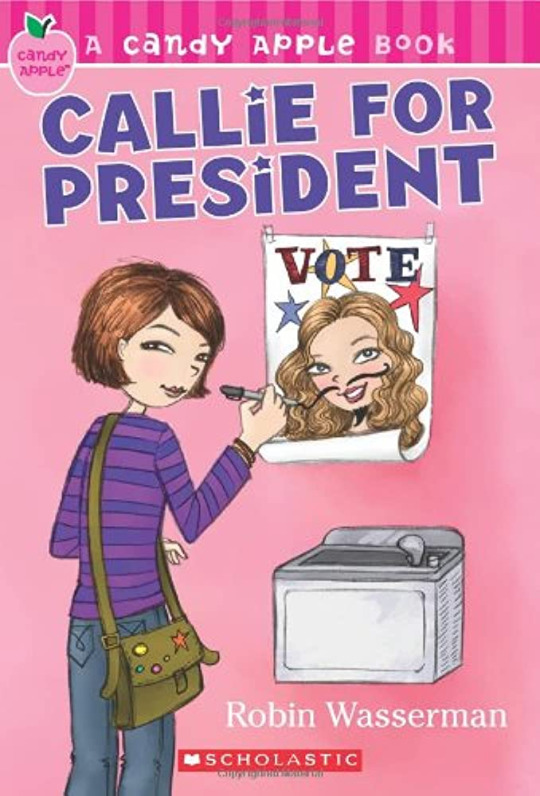
I’ve owned this book for several years now. I got it from a Scholastic Book Fair catalogue, I think. I got it presumably because I thought it sounded interesting, but I don’t remember for sure.
The premise is that Callie Singer has no interest in the class student council race, but when she’s nominated by her best friends Max and Fish to run for president against the girl she hates, Brianna Blake, she does everything she can to win, even things she would never want to do.
I’m not going to spend a lot of time on this book. I haven’t read it as often as the Valentine’s Day books, but it’s still a kids book so I’m not going to expend a lot of energy on it.
I appreciate how little Callie cared about the election and her school and whatnot. Pretty funny, I think. I think she didn’t spend enough time angry at Max, since Max is, essentially, the one that humiliated her by giving Briana and her goons the picture of Callie in a diaper. I guess I’m surprised, too, that Briana and Callie didn’t actually end up being friends in the end, but that’s not a bad thing either, and hopefully in the future they can just be neutral about each other. Also, Callie’s parents were zero help and also annoying.
Cute book, I guess, kind of whatever. 3/5.
My bookmark was a parchment paper tracing of Superman.
0 notes
Text
Totally Crushed by Eliza Willard

I’ve owned this book for several years now. I got it at the same time as The Valentine’s Day Disaster book, through a Scholastic book ordering sheet, if I’m not mistaken. I got it because it sounded interesting, I guess, though I don’t know for sure.
The premise is that seventh grader Annabel loves Valentine’s Day, but a mix-up with some Valentine’s flowers makes her believe that her guy best friend, Sam, likes her, even though her girl best friend, Phoebe, likes him. Annabel has to work to try to get them together without ruining her friendships.
I’m not going to spend a lot of time talking about this book because I’ve owned it for so long and read it so much that there’s no point to it, not to mention I didn’t keep a running list for it anyway.
I’m jealous of Annabel’s school’s Spirit Week; it was the kind of thing that only my younger grades could do, never the older grades (much as I wished it would). I also have to wonder just how well off her school is financially and how well staffed it is, considering they were able to throw not just a fair for the school, but also have three different field trips for three entire grades to three different locations on the same day at the same time, and then have a pizza party for one of the grades within a few days of that occurring. Like, seriously, what? I mean, the fair I can understand if all the students and clubs worked together to put it together, but jeez... Cool school I guess.
Cute book, nothing to it. Not as fun as the Valentine’s Day Disaster, but still cute. 3/5.
My bookmark for this book was a heart shaped pink sticky note.
0 notes
Text
The Valentine’s Day Disaster by Brandi Dougherty
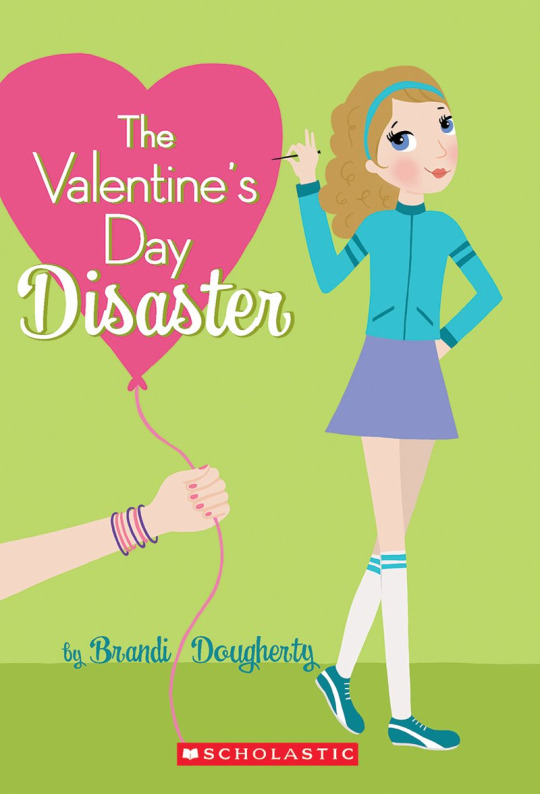
I’ve owned this book for several years, now; in fact, this might be one of the books I’ve owned for the longest. I got it from a Scholastic book ordering sheet somewhere around the fifth grade. I presumably got it because it sounded interesting, though I don’t remember exactly.
The premise is that Maddy’s soccer league fundraiser is cancelled for the Valentine’s Day dance at school. Maddy, who already hates Valentine’s Day because of an embarrassing incident the day before, wants to boycott the dance, but all of her friends, including best friend Sarah, want the dance to keep going, when all Maddy wants it to figure out how to save her fundraiser.
I’m not going to spend a lot of time talking about the positives and negatives of this book because, frankly, I’ve read this book probably at least five times, maybe more than that. Hell, I’m only reading it now for nostalgia and because it’s almost Valentine’s Day, and I thought I could read this one, plus the other Valentine’s Day book in my collection, leading up to the holiday. I finished this book on the seventh and I plan to finish the next book on the fourteenth, so exactly on Valentine’s Day.
Monica, Maddy’s older sister, was annoying and their parents definitely should have kept a better eye on her because she was so cruel to Maddy. Maddy, for her part, was definitely a bit too gung-ho about the fundraiser, which I realize and accept, but also nobody else was worried about it so I guess she had to pick up the slack. It was charming to read the fashion choices and compare them to fashions of today. I don’t blame Maddy for disliking Valentine’s so much, and especially with Monica hanging over her head, I understand why she does; I just wish more people understood, but it seems like most people just wanted to write over it instead.
Cute book, I enjoyed it for what it was. 4/5.
My bookmark for this book was a pink heart-shaped sticky note.
0 notes